Doggy-Dog People

Doggy-dog people
Doggy-dog people
Doggy-dog people get on my nerves with the things they make their dogs do
Doggy-dog people
Doggy-dog people
Doggy-dog people love their dogs more than they love you.
Doggy dog people think that four feet are better than two.
Doggy-dog people
Doggy-dog people
Can’t go out without a leash in their hand
They just can’t interact with their fellow man.
Without a doggy dog.
Doggy-dog people
Doggy-dog people
Doggy-dog people do pick up their doggy’s dog poo in little plastic bags
But sure don’t like being called out for what their woof-woofs do do.
Doggy dog people
Doggy dog people
Doggy dog people don’t have a clue.
That they’re accountable for the things their doggy dogs do.
Like beg food from your bowel when what you need is some peace in your soul.
Doggy people won’t leave you alone.
They need you to ask them what kind of a cute doggy dog they own.
Doggy-dog people,
Doggy-dog people get on my nerves with the things they make their dogs do.
Doggy dog people don’t have a clue
That they’re accountable for all the things their dogs do.
Doggy-dog people have no sense of esteem that doesn’t come with a leash wrapped round its throat and spleen.
Doggy-dog people
Doggy-dog people,
Doggy dog people have no sense of their own
So they sniff each others butts as its safer than being on their own.
Doggy-dog people
Doggy-dog people
Doggy dog people got nothing to say
They just walk their dogs all over my day
And look for other doggy dog people to cross their way.
Doggy dog people won’t answer for the things their dogs do
Because they’re Doggy-dog people and haven’t got a clue.
Doggy People got no love for mankind
They can’t stand themselves or the friends that they have
So they put their ids on a leash, follow their slave surrogate friends and Hope that petting a dog will somehow make amends.
Doggy-dog people,
Doggy-dog people get on my nerves with the things they make their dogs do.
Doggy-dog people don’t have a clue
Doggy dog people never answer for the things their dogs do
Doggy-dog people can’t talk to boys or girls on their own
They need a doggy-dog to break out of being alone
So If you see a doggy person walking down the street just throw them a bone.
And hope that they take their doggy dog home.and leave the unleashed people alone.
Doggy-dog people
Doggy dog people.
Doggy dog people,
Please leave me alone!
© Igor Goldkind 2022
Breathless: A Nostalgia for Oxygen

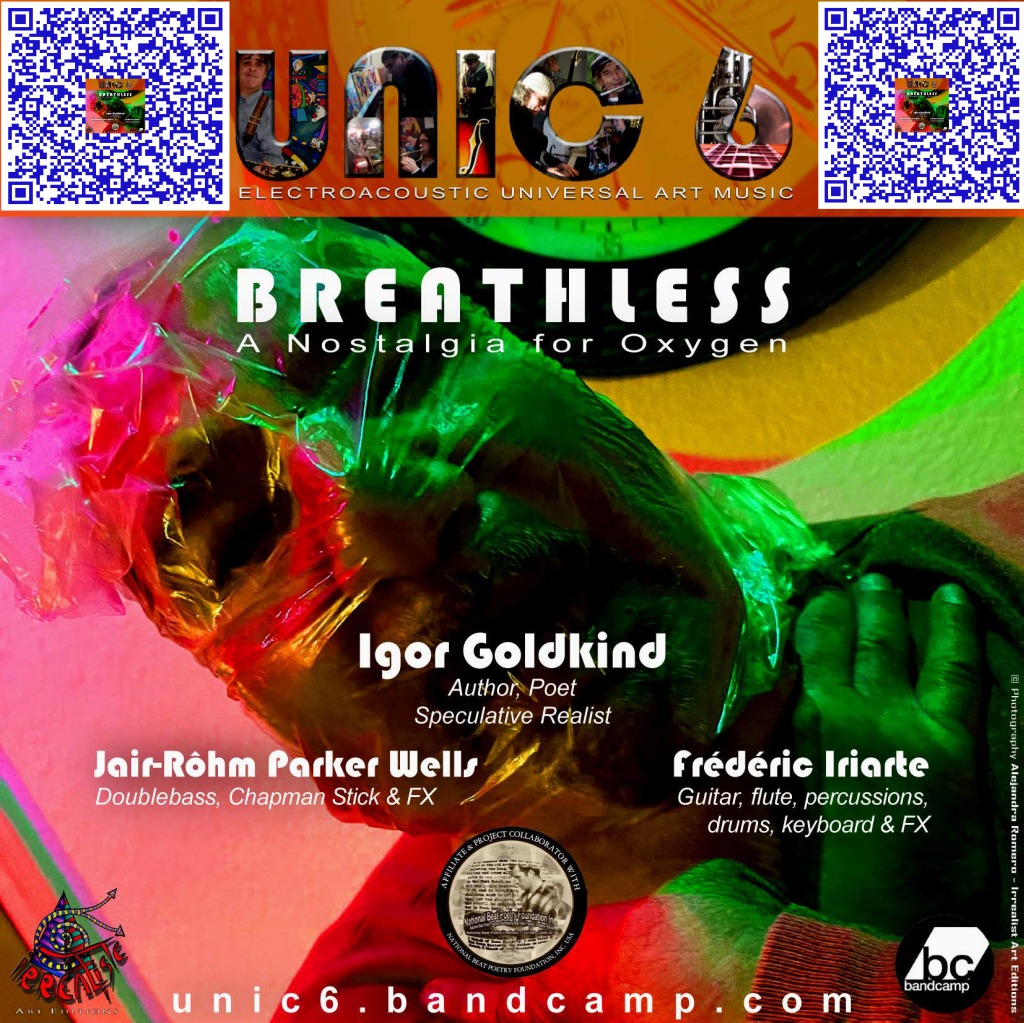
I’m a Poet, a Producer and lately a Publisher of aesthetic, sometimes eclectic content that speaks to the truth of living your life in today’s moment of existence. Beyond the Real World is the Actual World, which I prefer to inhabit. There really is only one world but social delusions, language and mathematics make us concoct a duality between the “Real” and the “Actual”. It’s just a trick of the light on our senses.
Oddly and recently, I’ve received a lot of flak and unarticulated hostility from people who just like the way things are. Either they get some advantage out of our current state of disconnect or they’ve become so habituated to futilely struggling, to being dehumanized that they prefer what they’re familiar with rather than facing the unknown of change.
Having a back ground in ‘technology’ I do know one universal truth about ‘systems’ and that is ‘systems’ can always be improved upon. In fact if ‘systems’ aren’t being perpetually improved, they fall by the way side and become impediments to useful change.
As is with technology, so it is true of the human community and its social structures. My father was an anthropologist and a sociologist at a time when the very word ‘society’ was being challenged as having no meaning.
My work is about returning meaning to the term “society”. to the set of complex interactions we consider collectively as the norm and worth compromising our individuality for. Society is us and what we make of it, every day of every interaction you have with another human, either well known or a stranger to you. How you treat others out of fear or openness is multiplied by millions and the sum total consists the society we are all part of and are all living in.
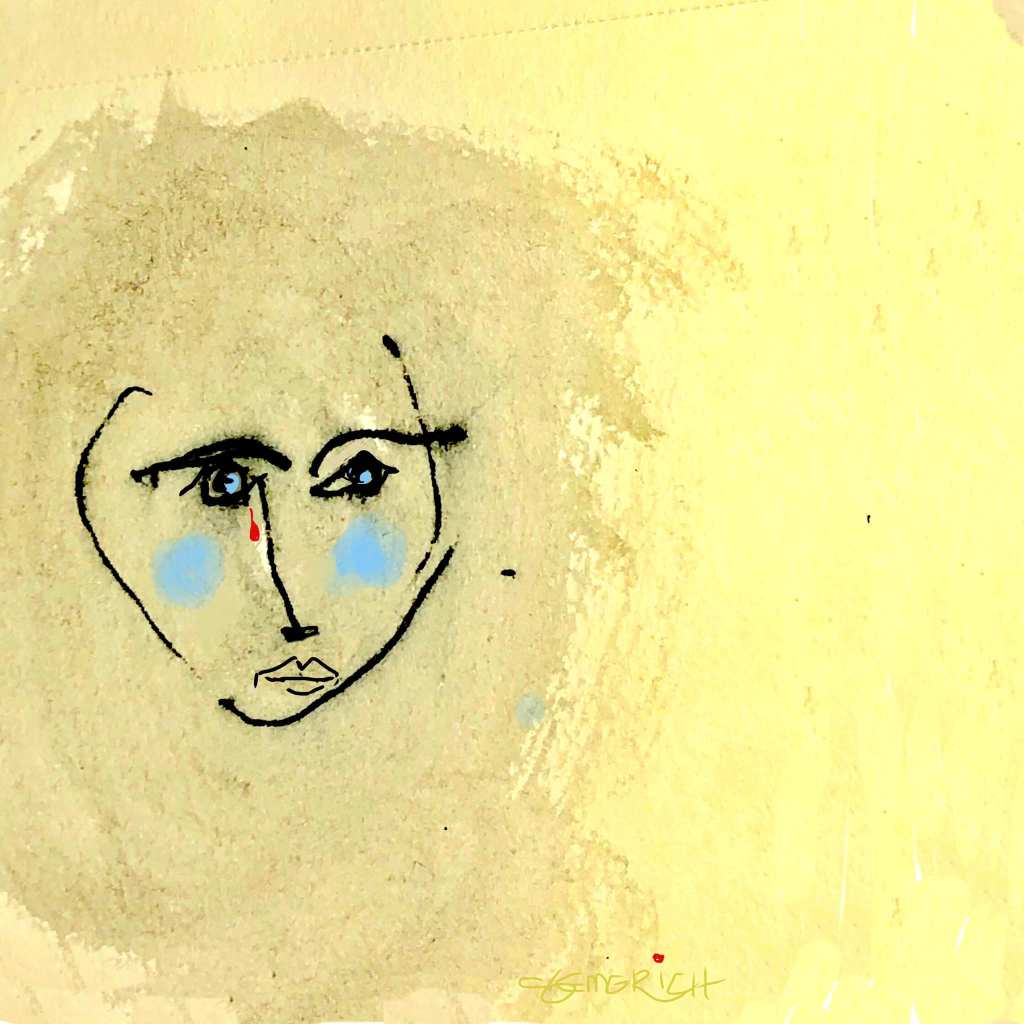
No man is an island and no woman can be exiled to one.
This is not about politics or ideology, this is about awareness and mindfulness as to how each of us is as part of a whole. There’s only one race, the human race and you are part of it. The only question is with what degree of awareness are you running in the human race?
Looking backwards, in hindsight, I now realize the the steady stream of anonymous antagonism and threats I’ve received over the past year all started when my album BREATHLESS – A nostalgia for Oxygen was released last year on Bandcamp by my spoken word producer Frédéric Iriarte and largely composed by my art brother Jair-Rohm Parker Wells.
I believe it is the most popular track from the album, I CAN’T BREATH, the last words of George Floyds recited as a spoken word, ‘found’ poem by a ‘white’ voice that triggered the attention that all to soon became menacing and I have had to take unprecedented steps to protect myself from.
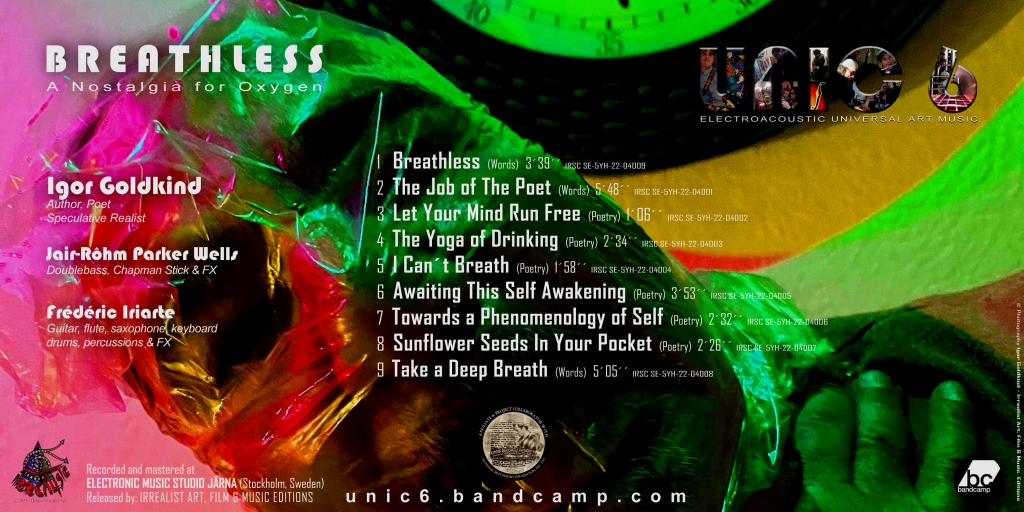
It is a tremendous album and well worth the free fee by which you can listen to it. I assure you that you’ve never heard anything like it before although I’m sure you’ve heard Ornette Coleman, Laurie Anderson, Willian Burroughs, David Byrne and Anthony Braxton. If not, you should listen to them too as they are the inspirations for our album.
Thank you for your attention, it’s the most precious commodity in the universe: your attention.
Death Becomes You

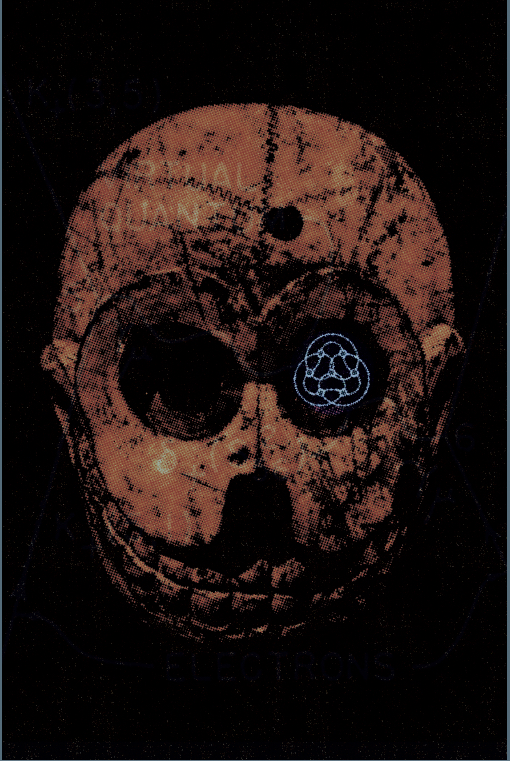
Thought for the day:
An old middle school friend’s father died yesterday morning.
So he called.
We’d been talking about the passing of his parent for a few weeks now…a drawn out disease where death has grown comfortable in the waiting room is no slow cruise. It is interminable waiting. It is placing your life on hold while the greater forces of life and death intervene in your routine.
This is death up close and centered. He’s in the waiting room sifting through the magazines. Death never entered the room. He’s always been there. Patient with our ignorance of his presence. He doesn’t care if we ignore or write poems to him. He does what he does, which is to attend and to await to present the final gift, the present life brings each one of us,
Wrapped in delicate personal memories; tied with a silver bow of faint regret.
I listen to my friend.
I listen to the scene he recounts in my head of an over eager hospice nurse, of a fatal dose of morphine.
He doesn’t want to sue, he wants me to write something,
to tell people what happened to his father.
Perhaps there is a story there to be heard but there’s the story that my friend is ignoring. The passing, the death of his beloved father, his parent, the man who held and protected him when he was helpless. Who first guided his clumsy thinking, his testing of the world. The source of advice, the font of all wisdom:
Pater meus a patre. Vos estis qui de caelo cadit, sicut pluviam et omnem animam in maius et luminare minus idem. Qui dedit nobis sitim extinguere pluvia rationem in radicibus excoquendi in sole.
Those of us who have lost a parent, both parents feel the shadow of our mortality move closer to us. It is not a selfish observation but a crucial one.
A glimpse into the truth of our own existence: short, meagre and thin.
The death of a loved one is tragedy but a necessary one. It is necessary to be reminded of the life we are living and the world that we are actually in. To wake up from the amnesia of wishes we have been distracting ourselves with, is to literally smell-the-coffee.
It’s bitter, it’s scalding and it’s blunt metal real.
Urgently real.
There is no solace for loss, just the empty space left behind by the one who is no longer there. Which is where you are, holding that space in your mind for them as someday, your loved ones will hold a similar space for you.
Maybe that’s where heaven is: the space your loved ones hold for you in their minds long after your body has left with death, the waiting room.
Poetry Therapy: Towards an Uncommon Sense

A Brief History of Poetry Therapy
From the collection of poetry, philosophy and art TAKE A DEEP BREATH: Living With Uncertainty
by Igor Goldkind (Chameleon Publishing, 2021)
Poetry Therapy, or poetry which is used for healing and personal growth, can be traced back to primitive Man, who used religious rites in which shamans and witchdoctors chanted poetry for the well-being of the tribe or individual. It is documented that as far back as the fourth millennium B.C.E. in ancient Egypt, words were written on papyrus and then dissolved into a solution so that they could be physically ingested by the patient and take effect as quickly as possible.
The first poetry therapist of historic record was a Roman physician by the name of Soranus in the first century A.D., who prescribed tragedy for his manic patients and comedy for those who were depressed. It is not surprising that Apollo is the god of poetry as well as medicine, since medicine and the arts were historically entwined. For many centuries the link between poetry and medicine remained obscure. The poet John Milton wrote in 1671:
“Apt words have power to swage The tumours of a troubled mind And are as balm to festered wounds.” Pennsylvania Hospital, founded in 1751 by Benjamin Franklin and the first in the United States, employed many ancillary treatments for their mental patients, including reading, writing and the publishing of their work. Dr. Benjamin Rush, called the ‘Father of American Psychiatry’, introduced music and literature. The writing of poems was was encouraged, and the results were published in The Illuminator, their own newspaper.
On the battlefields of the American Civil War, Union field medic Walt Whitman would administer recitations of verse to fallen soldiers who were well beyond hope long before the use of morphine. He was later to pen the classic Leaves of Grass, the greatest celebration of humanity in the midst of its own despair. Pennsylvania Hospital employed this approach as early as the mid- 1700s.
In the early 1800s, Dr. Benjamin Rush also introduced poetry as a form of therapy to those being treated. In 1928, Eli Greifer, an inspired poet who was a lawyer and pharmacist by profession, began a campaign to show that a poem’s didactic message has healing power. He began offering poems to people as prescriptions, and eventually started “poem-therapy” groups at two hospitals with the support of psychiatrists Dr. Jack L. Leedy and Dr. Sam Spector. After Griefer’s death, Leedy and others continued to incorporate poetry into the therapeutic group process, eventually coming together to form the Association for Poetry Therapy (APT) in 1969.
Librarians also played a major role in the development of this therapeutic approach. Arleen Hynes was a hospital librarian who began reading stories and poems aloud, thus facilitating discussions on the material and its relevance to each individual in order to better reach out to those being treated and encourage healing. She eventually developed a training program for those interested in teaching poetry therapy.
In 1980, all the leaders in the field were invited to a meeting to formalize guidelines for training and certification. At that meeting, the National Association for Poetry Therapy (NAPT) was founded. As interest grew, books and articles were published to guide practitioners in the practice. Hynes and Mary Hynes-Berry co-authored the 1986 publication Bibliotherapy — The Interactive Process: A Handbook. More recently, Nicholas Mazza outlined a model for effective 188 poetry therapy, also discussing its clinical application, in Poetry Therapy: 189 Theory and Practice.
The Journal of Poetry Therapy, established in 1987 by the NAPT, remains the most comprehensive source of information on current theory, practice, and research. There is also a relationship between psychological healing and incantations, either repeated as a musical chant by the patient or recited by the attending medicine man. Of course, modern medicine and science consider the notion of magical incantations possessing healing or restorative powers as so much superstition.
But this, of course, begs the question that if recitations and incantations had no evidential result and no beneficial property then why would have nearly every human culture have adopted the method and repeated it for thousands of years? Surely if there was no value to vibrating the air with the sound of one’s breath, rising from the abdomen, pushed upwards by the lungs, shaped by the throat, mouth and tongue, with the added stimulation of associative meanings being understood cognitively by the patient’s mind, we would have given it and its sisters, singing and chanting, up aeons ago.
I am not advocating a supernatural or spiritual causation for the effectiveness of poetry as a healing agent, but rather the supra-natural mystical cause which is grounded first in human nature and cognition, and for which there maybe a myriad of imprecise explanations, none of which can fully explain why it works. Today, poetry therapy is practiced internationally by hundreds of professionals including poets, psychologists, psychiatrists, counselors, social workers, educators and librarians. The approach has been used successfully in a number of settings — schools, community centers, libraries, hospitals, rehabilitation centers, and correctional institutions, to name a few.
SO HOW DOES POETRY THERAPY WORK?
• Poetry is beneficial to the process of introspection, and can be used as a vehicle for the expression of emotions that might otherwise be difficult to express
• Poetry promotes self-reflection and exploration, increasing selfawareness and helping individuals make sense of their world.
• Poetry helps individuals redefine their situation by opening up new ways of perceiving reality.
• Poetry helps therapists gain deeper insight into those they are treating.
In general, poetry therapists are free to choose from any poems they believe offer therapeutic value, but most tend to follow general guidelines. Some poems commonly used in therapy are: The Journey by Mary Oliver Talking to Grief by Denise Levertov The Armful by Robert Frost I Wandered Lonely as a Cloud by William Wordsworth Leaves of Grass by Walt Whitman Turtle Island by Gary Snyder as well as the poetry of Alan Watts, Allen Ginsberg and Antonin Artaud.
TECHNIQUES USED IN POETRY THERAPY
Different models of poetry therapy exist and are being refined all the time, but one the most popular is the model introduced by Nicholas Mazza. According to this model, poetry therapy involves three major components: Receptive/Prescriptive, Expressive/Creative, Symbolic/Ceremonial.
I. In the Receptive/Prescriptive component, the poet merely introduces the subject of how to focus on their own issue. The aim is to establish concentration and cognitive focus on the details, none which is revealed to the poet. Only when the poet feels confident that the subject is cognitively attuned to and non-verbally focused on the problem or issue of concern does he or she begins to ask suggestive questions as to how the subject feels, not thinks, about their issue. This provocation of tangible emotions usually comes in three distinct phases of emotional content. First is the predicament, when the subject becomes aware of the existence of the issue. This is a gateway phase, where anticipatory feelings are illicit and registered by the poet.
II. Then there is a further stage when anticipation of the issue has given way to the full experience of all the emotions, anxieties and fears related to the issue. This is usually overwhelming (or it wouldn’t be ‘an issue’ in the first place), and it is paramount that the poet guides the subject through distinct words to describe the layers of emotions experienced by the subject. The poet must ground the subject’s emotions in language. Language and the use of words is the key here, because emotions always come in complex clusters that make it difficult for both poet and subject to distinguish them and focus on the underlying causes.
“What kind of anger do you feel?”, “How would you describe your sadness?”, “How much shame do you feel? What would you compare it to?” This is a sophisticated method of word association, but rather than creating bridges between seemingly disparate words the goal is to drill down to the core emotions of the issue by refining the language, as led by the subject. Achieving exactitude of description is the task at hand. The poet makes careful notation of everything the subject says in regard to describing their emotions. It is important to keep them focused and not to succumb to intellectual distraction. Thoughts are illusions and often lies, whereas emotions are facts. Get the subject to correctly describe the facts of the matter. All meaning is metaphorical.
III. The final stage is waiting for an exit strategy. How do the feelings begin to recede? How does the issue move back into the background? What are the parting emotions? Is there anxiety about the leaving? Anticipation of an issue yet unresolved? Or is the issue impermeable, and subject to a rhythmic return? Again, the subject’s wording, their adjectives, adverbs and phrases are the material of the poem. At this point there is usually a short break to give time for the subject to recover from the emotional transitions and for the poet to briefly skim their notes and begin to focus on the flow of adjectives. It is preferable, if possible, to compose what amounts to a first draft, a flow of words which the poet can read back to the subject to confirm its accuracy.
At this first reading stage it is possible to start interjecting logical bridges between the emotional descriptors. This is the creative factor 194 unleashed. The poet, assisted by the subject, creates coherent sequences 195 between the emotional states. The poet suggests and the subject confirms or vetoes the phraseology, one line at a time. Now we arrive at a second draft which is the property of the subject. It is their poem. The preference is that the subject now reads the poem aloud and takes ownership of its content. The subject can redraft the poem a third time, or many more times, claiming it as their own. The poet has merely provided poesy prompts, the poem is the creation of the subject.
The expressive/creative component involves the use of creative writing — poetry, letters, and journal entries — for the purpose of assessment and treatment. The process of writing can be both cathartic and empowering, often freeing blocked emotions or buried memories and giving voice to one’s concerns and strengths. Some people may doubt their ability to write creatively, but therapists can offer support by explaining they do not have to use rhyme or a particular structure. Poets can also provide stem poems from which to work, or introduce sense poems for those who struggle with imagery. A poet might also share a poem with their subject and then ask them to select a line that touched them in some way, and then use that line to start their own poem. In groups, poems may be written individually or collaboratively.
Group members are sometimes given a single word, topic, or sentence stem and asked to respond to it spontaneously. The contributions of group members are compiled to create a single poem which can then be used to stimulate group discussion. The symbolic/ceremonial component involves the use of metaphors, storytelling and rituals as tools for effecting change. Metaphors, which are essentially symbols, can help individuals to explain complex emotions and experiences in a concise yet profound manner. Rituals may be particularly effective to help those who have experienced a loss or ending, such as a divorce or death of a loved one, to address their feelings around that event. Writing and then burning a letter to someone who died suddenly, for example, may be a helpful step in the process of accepting and coping with grief.
HOW CAN POETRY THERAPY HELP?
Poetry therapy has been used as part of the treatment approach for a number of concerns, including borderline personality, suicidal ideation, identity issues, perfectionism, and grief. Research shows the method is frequently a beneficial part of the treatment process. Several studies also support poetry therapy as one approach to the treatment of depression — it has been repeatedly shown to relieve depressive symptoms, improve self-esteem and self-understanding, and encourage the articulation of feelings. Researchers have also demonstrated poetry therapy’s ability to reduce anxiety and stress. Those experiencing post traumatic stress have also reported improved mental and emotional well-being as a result of poetry therapy. Some individuals who have survived trauma or abuse may have difficulty processing the experience cognitively and, as a result, suppress associated memories and emotions.
Through poetry therapy, many are able to integrate these feelings, reframe traumatic events, and develop a more positive outlook for the future. People experiencing addiction may find poetry therapy can help them explore their feelings regarding substance abuse, perceive drug use in a new light, and develop or strengthen coping skills. Poetry writing may also be a way for those with substance abuse issues to express their thoughts on treatment and behavioral change. Some studies have shown poetry therapy can be of benefit to people with schizophrenia, despite the linguistic and emotional deficits associated with the condition. Poetry writing may be a helpful method to describe mental experiences, and can allow therapists to better understand the thought processes of those they are treating.
Poetry therapy has also helped some individuals with schizophrenia to improve social functioning skills and foster more organized thought processes. It is important to note in many instances, especially in cases of moderate to severe mental health concerns, that poetry therapy is used in combination with another type of therapy and not as the sole approach to treatment.
TRAINING FOR POETRY THERAPISTS
Poetry therapists receive literary as well as clinical training to enable them to be able to select literature appropriate for the healing process. While there is no university program in poetry therapy, the International Federation for Biblio-Poetry Therapy (IFBPT), the independent credentialing body for the profession, has developed specific training requirements. Several studies support poetry therapy as one approach to the treatment of depression, as it has been repeatedly shown to relieve depressive symptoms, improve self-esteem and self-understanding, and encourage the expression of feelings.
However, the only qualitative measure of effective poetry therapy is in the poesy and the results. No accreditation can guarantee or substitute for the quality of cognitive empathy that is achieved during a successful session. Ultimately, there can be no real separation between the experience of the poet and the subject. This methodology provokes a meeting of mind in confrontation with universal truths. The poet is there merely to reassure the subject that there is no hocus-pocus, no supernatural or alternative reality, and that the cognitive associations that ring true are true in the present mind of the subject. The poet is on hand to reassure, to validate the responses of the subject to radical new perspectives into their own most intimate selves, and to relieve and dispel any accompanying trauma as grounded in the normalcy of human experience.202 203
CONCERNS AND LIMITATIONS OF POETRY THERAPY
In spite of its widespread appeal and broad range of applications, some concerns have been raised about the use of poetry therapy.
Some critics have pointed out it is possible for people to analyze a poem on a purely intellectual level, without any emotional involvement. This type of intellectualization may be more likely when complex poems are used, as a person might spend so much time trying to decipher the meaning of the poem that they lose sight of their emotions and spontaneous reactions. Poems that are unoriginal or filled with clichés are unlikely to stimulate individuals on a deep emotional level, or challenge them to think in ways promoting growth.
Just always keep in mind that poetry therapy may have little or no value for those individuals who simply do not enjoy poetry.
References:
Chavis, G.G. (2011). Poetry and story therapy: The healing power of creative expression. Philadelphia, PA: Jessica Kingsley Publishers.
Gooding, L. F. (2008). Finding your inner voice through song: Reaching adolescents with techniques common to poetry therapy and music therapy. Journal of Poetry Therapy, 21(4), 219-229.
International Federation for Biblio/Poetry Therapy. (n.d.). Summary of training requirements. Retrieved from http://ifbpt.org/obtaining-a-credential/getting-trained
Mazza, N. (2003). Poetry therapy: Theory and practice. New York: Brunner-Routledge.
Olsen-McBride, L. (2009). Examining the influence of popular music and poetry therapy on the development of therapeutic factors in groups with at-risk adolescents (Doctoral dissertation).
Rossiter, C. (2004). Blessed and delighted: An interview with Arleen Hynes, poetry therapy pioneer. Journal of Poetry Therapy, 17(4), 215-222.
https://www.facebook.com/realpoetrytherapy
realpoetrytherapy@gmail.com
Riding Johnny’s Train

I’m on your train,
Riding through the lower melodies like
Cars crashing through steel
Leaving twisted steel in our wake.
It’s momentum builds mass.
The faster we think the thicker we get,
The heavier gravity’s pull.
Can we escape our bodies?
Why can’t we just take our bodies with us?
Eternity surly has enough room
Our bodies are vinyl cartwheels spinning after us,
The tails of burning meteors.
We burn atmospheres so fast and hot
We don’t even know we’ve arrived
Until after we’re long gone.
And now that we’ve arrived, we’re much too early
For supper.
For the show to begin.
Unless of course, it’s already ended and we missed it again.
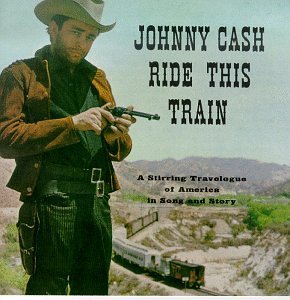
On Poverty and Consciousness

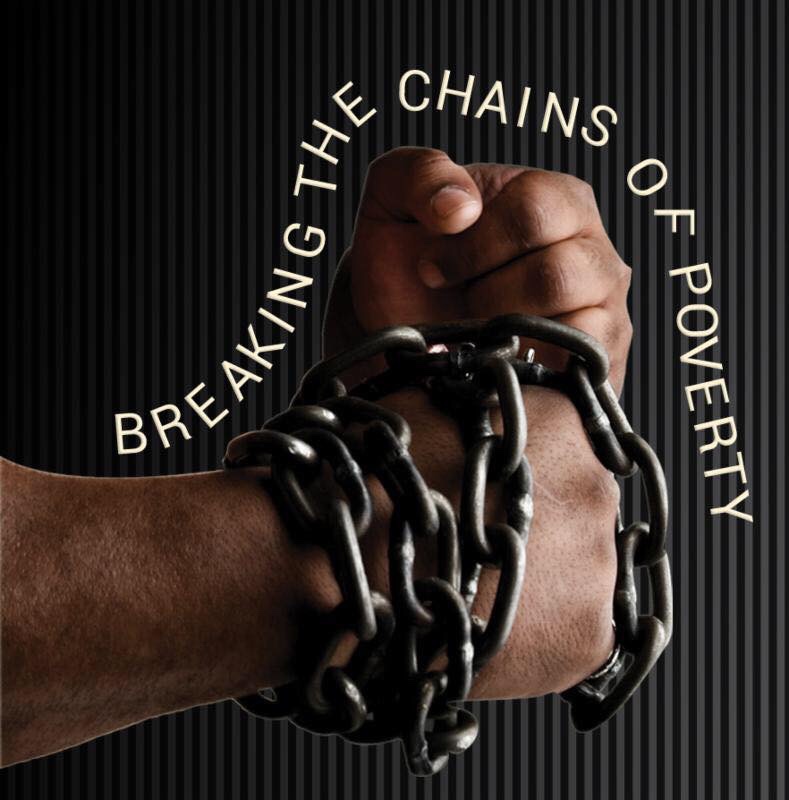 A new acquaintance asked me why I endured relative poverty and uncertainty in California when I could easily take a tech copywriting or PR job and be living comfortably.
A new acquaintance asked me why I endured relative poverty and uncertainty in California when I could easily take a tech copywriting or PR job and be living comfortably.
I answered, for which I’m sure someone reading this might wonder the same.
The answer is not simple and all has to do with my commitment to art and to the art of writing. It’s somewhat like a religious or spiritual calling; certainly as requisite of sacrifice and discipline as a monastery. (Read James Joyce’s Portrait of an Artist as a Young Man, if you need further elucidation on the subject). To become a great artist, which is what I believe I am becoming at this late stage of my life (or will at least die trying to be), takes total focus and constant dedication.
Not just to creation but to observation. Many of my best friends are not just poets and artists but scientists and mathematicians because they are processing their own observations through their own disciplines. When we talk and share words they read me and hear me, they comprehend how we’re all pursuing the same thing: the truth about life and the lives we are living.
Science and Art are really just two different vantage points in the same universe. During our Rennaisance there was no such separation between science, engineering and art. Just look at Da Vincis’s sketches if you don’t believe me. And this underlines the true failing of the formal education systems. No purely structured system can account for, much less process the unstructured data of experience.
But one truth I have learnt along this way is that we are all connected; both as a species and as sentient beings. Not just to those existing in the moment we all share but for all of us, from the very beginnings of awareness and rational self-consciousness. We are all brothers and sisters of the same mind, the same awareness that is awake and cognicent.
We all share the same biology of the mind.
I imagine that when extraterrestrial sentient life is contacted, it will be the poets and artists most open to the new who will not only best describe and communicate qualitative meanings with them but decipher their language(s) to communicate with them (more of “us”?), before the actual scientists can interpret their data and the military can rationalize the threat.
From the point of commonality; this sentience itself has a common shape or form in all of us throughout time and geography. It is our human nature.
My words try to sketch its outline.
Without needing to name a god, the Buddhists have been attempting to describe this commonality of all sentient beings, for thousands of years. In art and yes, in poetry too.
It’s what poetry is for: to describe the indescribable that is true for all of us, to all of us.
The known shining its single torch down a darkened corridor to the unknown.
The unknown (not the unknowable), has always been our mind’s final frontier.
We weren’t born yesterday. We did not just become aware of consciousness. The history of consciousness is the history of us, of the ‘you’ that is reading and comprehending these words.
You are no different in awareness than the Neanderthal who stumbled out of her cave and looked up at the stars in wonder. Every astronomer I have ever known harbors that exact same wonder. Our tools maybe bigger, faster and deadlier but our minds haven’t changed, just adapted to our tools. They’re physiologically still the same; and only enhanced by the evolution of language, both associative, symbolic and metaphoric.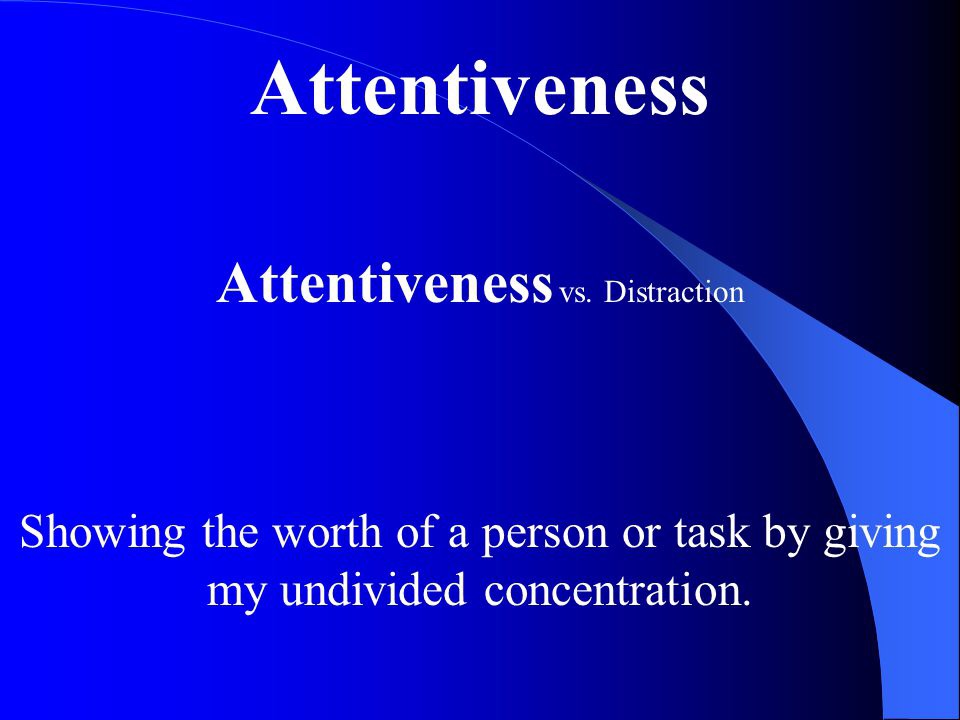
This is where we alll connect. The commonality of our senses’ perception and their comprehension. This is what is meant by ‘realisation’. When we make the world real. When we realise that the truths we know from our senses connect us to the world as intimately as to each other.
These are the materials I use to create art.
But why not get a day job?
I will have to.
I have learned all I can stomach for now about the tangible reality of poverty. I have made some great and tragic friends outside my walls of privilege and comfort. But when I first detected my dwindling resources, I panicked. I borrowed gas money from friends, slept in beachside campsites for free and spent too many days in chic cafes nursing one cup of coffee and a refill just to write, just to connect with the non poverished. I. applied for every job I was qualified for and hustled my books even harder.
But this did not avert my panic and the fear, until it passed of its own. And you already knnow: nothing is ever as bad or as long as we first imagine it to be. That’s when I understood how many of my needs, weren’t needs at all and that I could live without the comforting requisites of a middle class existence, just fine. In some ways better.
Less consumption = less waste.There’s what I want and what I can have and if I diminish my wants, I can have have everything I want.
When you don’t have any money, you don’t spend any money and that initself is a good thing.
The last argument that pursuaded me of the virtue of experiencing this lifestyle is that if I really wanted to write for wider audience in a profound and meaningful way, that I might need to understand and empathize with the truth of our human condition across the entire economic spectrum, not just those who can afford to buy books
And the truth is that the vast majority of “us”do not live a middle class lifestyle and that the majority of “us” struggle every day to earn what is called a living and yet seldom ressembles it.
I have met so many, so many poor people living on the streets in one of the wealthiest cities in the wealthiest state in the union, in the wealthiest nation in the world.
None of us can afford to rest within our illusion of justice and freedom until poverty is no longer the default state of the human condition in America. Remember, poverty is a prison from which escape is difficult. But if we truly want to say that we live in the land of the free, then we must free our citizens from the prison of poverty.They are “us” as well. Not charitable”us”, not pitiful “us”, not lazy, drug taking, alcoholic “us”.
Just us.
I have talked in depth with enough of the so-called “homeless”. to recognize them for who they really are: The Poor. You know, those people Jesus was always talking about and Charles Dickens and Emile Zola wrote about? The idea that those without homes choose to live that way is a bigoted urban myth that need to be quashed.
Yes, may of the poor have real problems with alcohol, drugs and severe mental illness. But so does every other group and class of people I have ever known. The rich and the middle class aren’t exempt from alcohol, drugs and craziness; in fact they can afford more!
How then are we less connected as human beings?
Or is “humaness” only measured by level of income?
When I moved back to California to look after my mother, I was immediately struck by the avalanche of poverty that had engulfed my home town. As is every other foreign visitor to California, by the way. No tour of Balboa Park or visit to Sea World can eradicate the open poverty that everyone can see on the streets of San Diego. Which now more closely ressemble the streets of Port-au-Prince, Haiti or the extreme poverty that can be found in some places in Mexico, than any American city.
The first thing that went was the last vestage of regional or even national pride.
It is a crime against humanity for so rich a city as San Diego to maintain the level of homeless poverty that is evident to anyone who visits us. It is “our” fault. Because we are also connected to the impoverished and the socially weak.
You know, what Jesus was saying.
If I am to write the truth for those who want to read or hear the truth, then I ought to know what is lying outside the walls my middle class habits and worldview. What is it really like, not just for the impoverished but for the vast majority of Californians who also now live beyond the walls of middle class sensibilities, paycheck by paycheck?
Haunted by the memories of its long gone comforts.
What does it mean to be a human being living in America right now, in 2020. Aren’t we all supposed to have jertpacks by now?
What is the Truth of our American selves?
As Tony Morriosn said “The whole point of freedom is to free others”.
To my friends who have offered their support, I thank each one of you.
I will never forget your kindness and your humaness.

Yes I have a new book coming out in the fast approaching Spring.
It’s entitled TAKE A DEEP BREATH, A Book of Remedies and will feature much of the writing and accounts of experiences of truth that I have had living in California these last 5 years.
I hope that you will take a look.
San Diego Beats Poets

San Diego poets are wet gutter snipers
Taking pot shots at frivolous affluence and misspent eternities
From the street corners and back alleys of our prematurely grey dementias.
San Diego poets cast lines like fishing reels
Screaming curses at angels in heels while
Humming blues tunes to the damned, under our breaths.
San Diego poets spit surreal spiels into ribbons of unfurling images
That rain down like bright pathetic confetti
Against a blank horizon of an empty human empathy.
San Diego poets slide their wild, horse hair bows
Across taut, tied strings that sing
Above a psychedelic landscape of the gradually worsening human condition
You and me are not blind instruments of self-immolation.
We do not have to sit at the center of the fire to make it our home.
We can play our songs on sad air violins
And dance in the rain to drown our sorrows in the sea of greater uncertainty.
San Diego poets press our runny noses against
The pained windows of badly lit coffeeshops and crafty bookstores,
Hosting poetry readings for the over groomed;
Those educated only in the blind arrogance of their own judgements.
San Diego poets litter the streets with our menial typewriters
Preaching doomsday fire sales to tourists and
Liberation to those still hounded by carnivorous ambitions
In the current climate of fear that tries to pass itself off as survival.
San Diego poets never have enough money to buy you a drink
But will spare you a cig-regret –
–if you’re willing to spare the change you need you to make
–to make your tomorrow just a little bit better.
San Diego poets are all clowns, fools and charlatans
Keeping ourselves amused on the ragged streets of cold hangover dawnings
Whilst skipping around and dancing through the circus of mediocrity that pervades us.
San Diego poets migrate like flocks of hummingbirds
Seeking warmer climes and heartfelt compassions.
Blurring our wings the whole distance in getting there.
© Igor Goldkind, January 2020
What He Said She Said (v2)

She said Hii!
I said hello
She said let’s go for a drink.
I said sure.
She asked ‘what are you having’?
I said, whatever you want.
She said, thank you for thinking of me first.
I said your pleasure is all mine.

Later she sent me a text.
‘Have you ever tried phone sex’?
She said.
I said ‘Sure’.
She said how about now?
I said I need to go home.
She said she did too,
She sends me a naked picture of herself.
“Are you hard”? She asks
‘Sure’, I said.
“I want you to fuck me”, She said.
‘Shall I come over’? I say.
“No”, she said.
“Let’s meet and fuck tomorrow.
But for right now, just this moment
Can you just talk to me”?
‘Sure, ‘I said.
“Right now I just want you to tell me how you’d like to fuck me.
‘Do you want me to come over,’ I said again.
“No,” she said,
“Don’t come over
Just talk to me and make me cum.
I just love the sound of your voice”.
‘Sure’, I said. And she did.
‘Are we still getting together tomorrow by the fountain in the park’?
I asked, after a while.
‘Of course’, she said.
‘Great’, I said.
The next morning she sent me a message:
“I’m sorry but your age is something
I just can’t get past,
I’m not meeting you next to the fountain, I’m sorry.
You’re just too old and I shouldn’t have let things go so far
I just can’t get past that; your age”
‘Sure’, I said. ‘Neither can I without fatal results’.
She did not laugh
“I’m sorry, but that’s how I feel” She said.
‘That’s how you feel’, I said.
Later that morning I died my hair black
and left dark stains in the sink.
Poetry Therapy

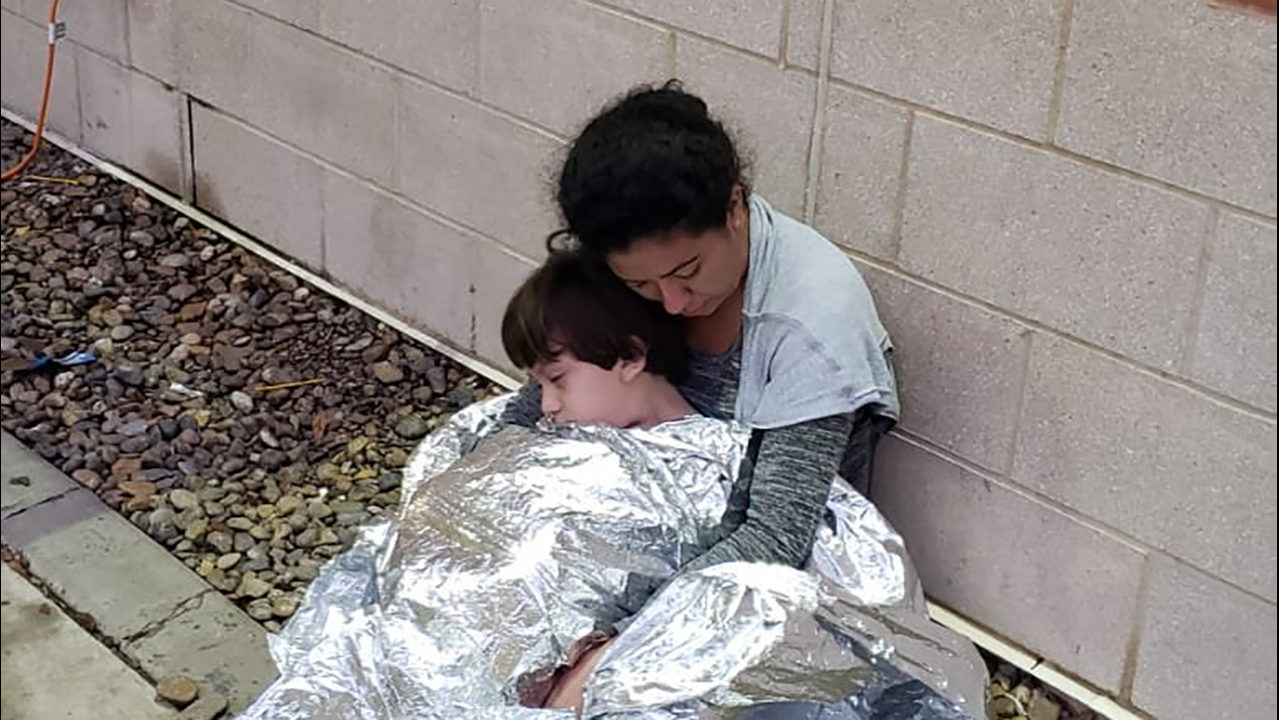
Everyone wants to be free.
ven from the things that once gave us comfort.
We are like children who swap our blankets
For softer ground.
So why do you wait to be free
When the keys to your cage
Are hanging right outside your front door?
Reach through the bars with your hand
Stretch your fingers far and bend your will around the bars.
Your mind is your best friend, your best teacher, your best doctor,
Whether you believe it or not.
In spite of everything you’ve done to yourself,
Your mind really does care about you and often thinks of you, quite fondly.
Just let your mind mend itself
Heal yourself with a few choice words.
Your own words.
When you say:
The truth is not a cold tombstone
The truth is not a judgement
The truth is a flowering realisation inside your own living mind.
Pulling you outwards, & forwards, enraptured by Time.
When my breath and
My will are as one,
The universe swallows me
Whole.
The Stars

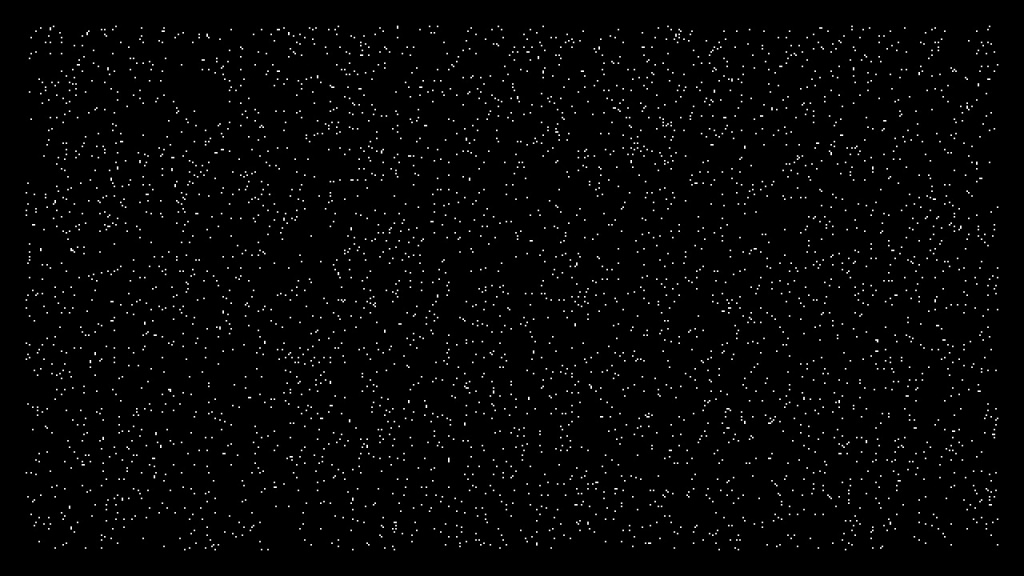
There are few shreds of dignity left
When you drown face down in your own back street gutter.
You can cry out as loud as an archangel’s horn, if you like.
It won’t do you any good, or any harm either.
You still can’t silence the wind or turn back the tide.
Fate is nothing personal.

It’s just the universe catching up and then passing you by.
Your dream of yourself evaporates,
Forming clouds that obscure the night’s sky.
The stars are leaving you now, blinking out one by one.
This is the last moment of your own
self-awareness.
Your last chance to figure out what the fuck’s been going on.
It’s very much like the moment you first awoke
Although your mother’s smile is nowhere to be found
All that remains of her unlimited love is your fast fading memory
The sound of her voice calling out to you to come home now,
In the far distance,
From where the stars have gone to mourn your passing.

So You Think You’re Going to Shoot Me?


So you think you’re going to Shoot Me?
I got news for you goyim,
You’ve been shooting at me for 900 years
From arrows to bullets to canon and you still haven’t hit me.
Because I am no other than you.
How can I replace you when I am you?
Open your eyes, you are shooting the gun at yourself.
You don’t get it.
This must be the trick of the devils’ twisted tongue, right?
The one that tries to deceive you
With the facts of truth
Poured from the grail of reason.
Go on, have a gulpful .
No, you can’t shoot me, you can’t even aim straight.
Your hatred is so predictably boring,
Always looking for someone else to blame
For your failure as a human being.
Anyone should do, but
Just like a bad movie cliche, you pick the Jew.
How can you shoot me,
When most of us are already dead?
Replaced, misplaced, driven from your nations’ borders.
Baked in your ovens.
Never even pausing
To wonder what the difference ever really was.
Now we have nations, guns and missiles and
Our own black-booted armies, to protect us from bad shots like you.
To protect us from everyone but ourselves.
Now we can sip from the same blood cup,
While hating then shooting,
All of the Other Jews.

Our Lady

You are our lady
And now your dress
Is flames.
The beauty of your sunken dome from a drone
Is a poem in itself.
Written by us and
Destroyed by chaos.
This is what we do that rivals the stature of the gods:
To astound ourselves and each other,
With the wonder of
Pure enduring creation.
The sacrifice we all make to our better selves
Who gave buildings wings and
Lay the foundation stones of
Our own perfecting.
Epiphany is not found in the act of worship
It is found in the insight gained by a gratitude for the world.
Exactly the way we built it.
Exactly the way we know it to be.
Whispered prayers are but poetry
That none other than you will listen to.
It is good to talk to yourself,
To sing in harmony with all the selves who are listening,
Wearing
Not false, but true masks
Revealing the kind of truth that can only be told with a lie.
The subtler architecture that carves heavens into the spaces on this earth.
Reconstructing what can be seen behind your faces,
Behind all the saints who guard you,
Behind the divine grace of your stature.
The sensuousness of your catastrophe is breathtaking.

© Igor Goldkind 2019
Confetti

There’s an emptiness at the heart of any space:
The air that escapes a room; an unanswered echo, a vacant womb.
There’s an emptiness in my heart
That reminds me
All of my ideas are empty.
Floating leaves from a fumbled folder.
Coloured streams falling from the sky.
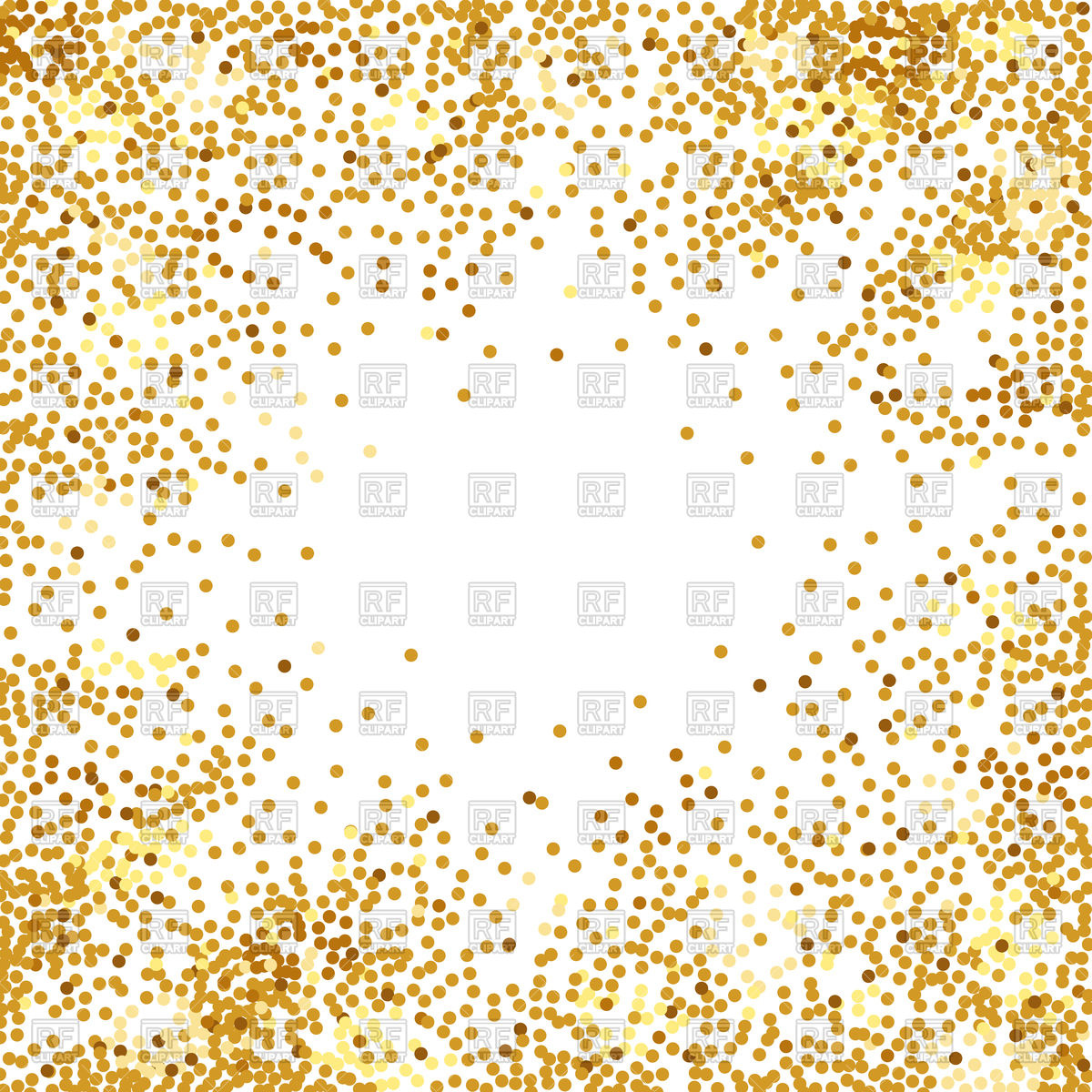
This emptiness reminds me
How slight my desires really are
How gently they fall from the sky
A confetti of mercy and discarded emotions,
They are in the end,
Compared to nothing,
Merely the litter from an emptied mind.
Being is Becoming Still


Existence is a limitless screen of emptiness
Vibrant with jubilant celebrations.
And gratitude for the joy in rolling a boulder blissfully up this steep hill.
Tripping over our own thoughts like loosened cobblestones,
We no longer see the reality directly in front of us.
The truth is a truce we struck with certainty ages ago.
After losing the desperate struggle…
To cling to some kind of hope buried deep beneath the root of ourselves.
I am fearful of fully failing myself and yet
I love myself best when I am alone with eternity.
Suicide Note:

There are still a few options available to you still, apart from death.
Yours is a free choice.
Your death is yours.
No one is making you choose;
Death is after all, inevitable.
Not so much an option as fast forwarding to the point where there are no further options.
Living is dying anyway, so why speed up the process?
To stop the pain?
Many have endured much more
Still clinging to any delay of the inevitable.
Regardless, suicide doesn’t stop the pain it merely passes the suffering on to someone else.
Remember them?
They remember you.
They will remember you with pain.
You no longer feel of worth or of value anymore?
To whom, exactly? yourself?
Perhaps your judgement is drunk or wanting in discernment?
Perhaps your judgement is just wrong and awaits over-ruling by a higher judgement.
Who are you, really, to judge yourself so severely?
If you are worthless then your judgement is suspect and certainly not worth acting upon.
What if you went and saw a movie instead?
Or got drunk?
Or went to sleep?
Or made love until the dawn found another, better judgement to wake up to.
A truer, more temperate version of yourself.
One who can solve problems and get you out of the sweet jam you’re stuck in.
Do you long to die because life is absurd and void of meaning?
What took you so long to notice?
Does your slowness make you want to do things quicker?
Instead of death, you could seek laughter, which is really a form of dying;
A release from the known into the unknown by way of
Catching your breath inside its own rhythm.
Inwards and outwards.
What if you were about to hear a joke you’ve never heard before?
That made you laugh so hard that it woke you up into the wide-eyed, open world that embraces this one?
If you die now, you will miss hearing the eternal joke
That would awaken you to a world where you no longer wanted to die
Because you suddenly found yourself here,
Where you belong
Where you belonged all along,
Not living or dying
But blinking and breathing like this,
Like this, like this, like this…
©Igor Goldkind 2018
5 Submissions of My Latest Work

Life is Always Replaceable
Being is Becoming Still
Existence is a limitless screen of emptiness,
Insomniac Awareness
The Last Halo of Hope.
Pebbles
Meditations on My Self

This morning after sitting around and paying attention to nothing for a long while, the pedestrian thought that loitered and would not keep moving down the sidewalk became a realisation.
My self, which I know is an illusion, a trick of perception, occupies too much of my time. I know this fully with my mind even if my heart still clings to safe delusions.
The easiest thoughts to dismiss are the good ones, the comforting ones. The memories of past loves long gone. My mother’s unconditional love, my sister’s devoted, admiring love. The eulogies and compliments I’ve received over time from those who have borne the patience to get to know me just a little bit beyond our facades.
The pleasure I took in surprising my friends with my true nature is easily exiled, easily erased from the Book of Illusion resting on my dusty shelf. But today I awakened to the fact that so it is of the slings and arrows my memory flings at me. The regrets, the failures, the self-loathing for being so much less than I imagine myself to be.
I have welcomed hatred like a long lost friend. When I am targeted by malice or false accusations, I somewhere believe that I am well deserving of acrimony; that deep within me is a broken porcelain doll wearing a torn, stained dress. 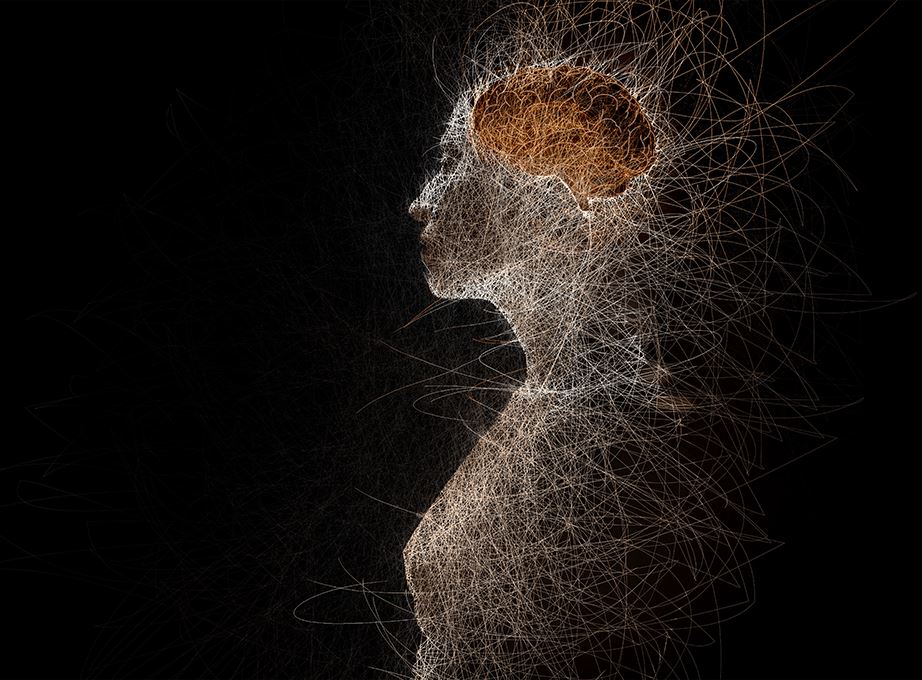 I have sought refuge in self-hatred, in depression, in the idle futility of it all.
I have sought refuge in self-hatred, in depression, in the idle futility of it all.
After all, cynicism is just another mask worn by our own complacency.
This morning, the light shone on me and I laughed at how insidious my vanity could be. To soak in self-loathing is as deluded as celebrating false glories. None of my past is real apart from what I insist on carrying into this present like a troublesome burden; weighing down my footsteps. Stalling the will to keep on moving, with the current, a little further down the road. Misery, the sister of Narcissus, loves company and the good liquor I buy her. But she’s too needy and crazy and no real friend of mind.
I may feel brave wrestling with my demons but they are in truth, made of the same scattered dust as my angels.
My Buddha tells me that enlightenment lies in the transcendence of seeming dualities. The trick of mind in seeing beyond black and white to the full spectrum and subtleties of the colors surrounding me. I can hold my inner sense of self, both magnanimous and self-damning, one in each hand and then bring those hands together, accepting both as one simultaneous truth.
I can know myself completely, even the parts left out.
Rumi says that beyond right and wrong, beyond good and evil, lies the desert of disillusionment.
At the end of the desert there is an oasis and in the middle of the oasis is a fountain and that fountain is the source of all Life.
Do me a favour, next time you feel down about yourself, undeserving of love, miserable and useless; do not blow the feelings away but rather hold them in one hand. Then with the other hand conjure the feelings of pride, of self-worth of glorious love. Hold each sense of yourself like a ball in each of your hands while substituting either/or with both/and. Now bring your hands together in gratitude for the whole of who you are.
Tell me how that feels.
Write it here, just beneath these words.
The Halo of a Hope


Hope is mortal, not eternal.
Though it may feel like eternity
Sitting in a chair by the window.
Gazing up and down the path that leads
Up the hill and down to the canyon on your doorstep.
Every morning, every evening, every day.
Waiting for an answer to your prayer for hope to be restored.
Resilience rewarded
Patience still burning brightly
Under your old photograph on the wall where you live now.
I’m not sad.
No, sadness is just passing rain to irrigate the eyes.
Instead, I’m a new planet
Ringed by the last halo of hope
The one wrapped tightly around my head.

Pebbles

Pebbles
Thoughts are merely pebbles
Being gently washed by a passing stream.
You are the stream.
Beach Pebbles
Thoughts are merely beach pebbles
Being gently rounded by passing waves.
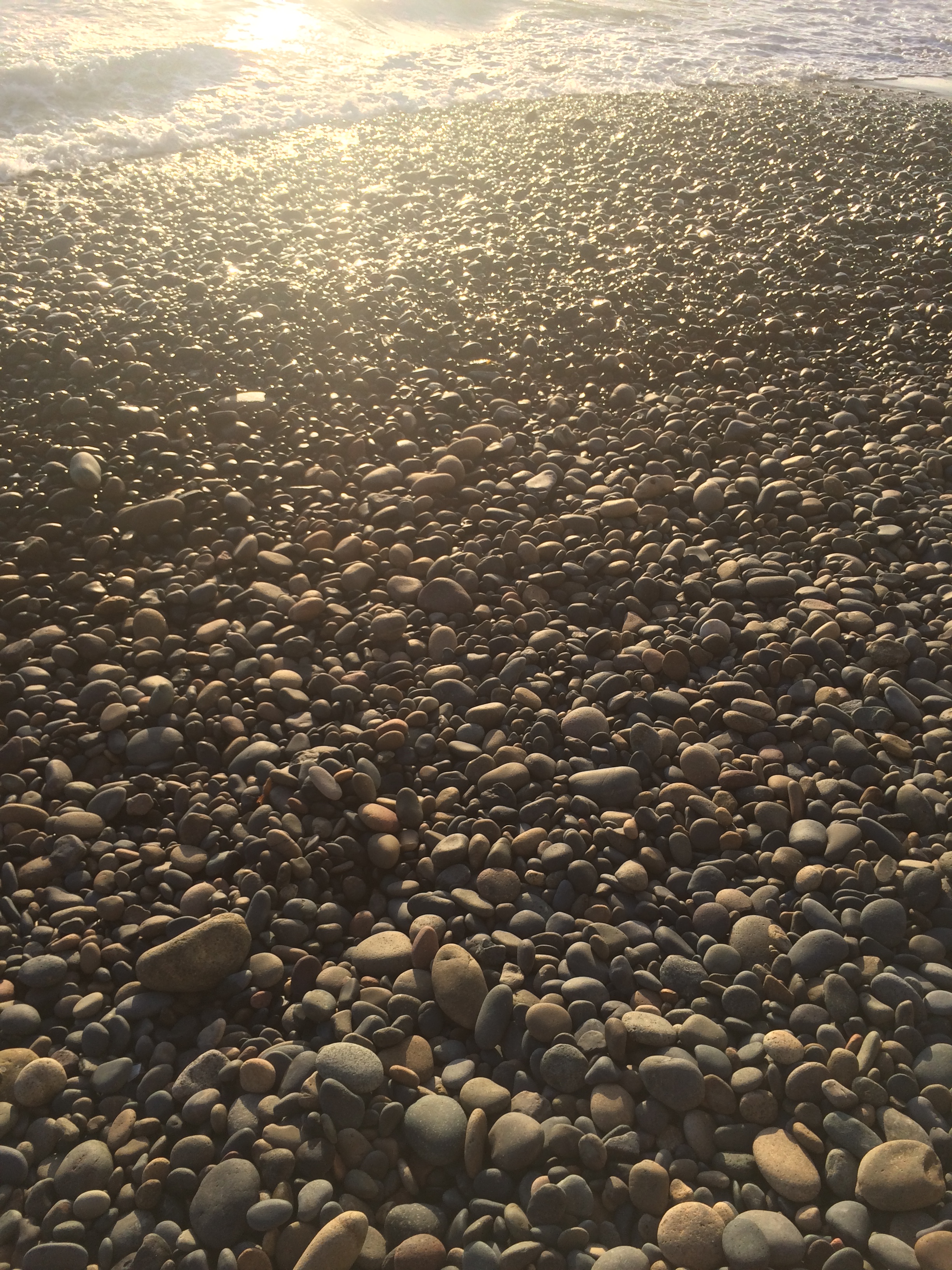
Pebbles
You are the waves.
Sand Pebbles
Thoughts are merely pebbles in the sand.
Being gently worn by the passing wind.
You are the wind.
Words are pebbles.
Words are merely thoughts
Being gently read by a passing eye.
You are the eyes
That can read my thoughts.

Thoughts
Being is Becoming Still


Existence is a limitless screen of emptiness,
Jubilant celebration
And gratitude for the joyous exhaustion in the rolling of a boulder up a steep hill.
Tripping over our thoughts like loosened cobblestones,
The truth is a truce we struck with uncertainty ages ago.
After losing our desperate struggle…
To cling to some kind of hope buried deep at the root of our own awareness
I am fearful of fully failing myself.
But I love myself best when I am alone with eternity.
Secure and supported by this very clarity.

Being is Becoming Still

Existence is a limitless screen of emptiness,
Joyous celebration,
And gratitude for the joy in rolling a boulder blissfully up a steep hill
Tripping over our thoughts like loosened cobblestones
The truth is a truce we have struck with certainty.
After losing the desperate struggle…

To cling to some kind of hope buried at the root of ourselves
Does choice invalidate certainty?
By undermining the sense, the unravelling of our story.
I am fearful of fully failing myself.
Although I love myself best when I am alone with eternity,
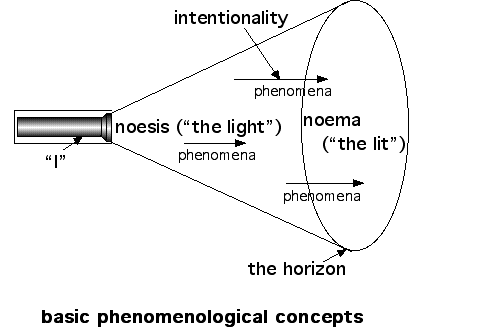 Secure and supported by this universal clarity.
Secure and supported by this universal clarity.
Blue Notes

 Depression is merely an afterthought.
Depression is merely an afterthought.
 We are slaves to our memories
We are slaves to our memories
Your Soul

So who is this Soul that you sing of?
This silent witness
Who counts the leaves off of trees
Instead of gathering them?
And raking them into a funerary pile,
Into the giant pile that your better self will set afire and then fall from,
Or jump into.
Up to your eyeballs,
Up to your own personal crown of thorns.
A Short History of Poetry Therapy: Practice and Perfection by Igor Goldkind

On FaceBook, a discussion where questions are posed and answered: https://www.facebook.com/realpoetrytherapy/
The healing effect of words has long been recognized. As far back as 4000 BCE, early Egyptians wrote words on papyrus, dissolve them in liquid, and gave them to those who were ill as a form of medicine. In more recent history, reading and expressive writing have been employed as supplementary treatments for those experiencing mental or emotional distress. Pennsylvania Hospital, the first hospital established in the United States, employed this approach as early as the mid-1700s. 
In the early 1800s, Dr. Benjamin Rush introduced poetry as a form of therapy to those being treated. In 1928, poet and pharmacist Eli Griefer began offering poems to people filling prescriptions and eventually started “poem-therapy” groups at two different hospitals with the support of psychiatrists Dr. Jack L. Leedy and Dr. Sam Spector. After Griefer’s death, Leedy and others continued to incorporate poetry into the therapeutic group process, eventually coming together to form the Association for Poetry Therapy (APT) in 1969.
Librarians also played a major role in the development of this approach to therapy. Arleen Hynes, one pioneer in this area, was a hospital librarian who began reading stories and poems aloud, facilitating discussions on the material and its relevance to each individual in order to better reach out to those being treated and encourage healing. In 1980, all leaders in the field were invited to a meeting to formalize guidelines for training and certification. At that meeting,  the National Association for Poetry Therapy (NAPT) was established.
the National Association for Poetry Therapy (NAPT) was established.
As interest grew, several books and articles were written to guide practitioners in the practice of poetry therapy. Hynes and Mary Hynes-Berry co-authored the 1986 publication Bibliotherapy – The Interactive Process: A Handbook. More recently, Nicholas Mazza outlined a model for effective poetry therapy, also discussing its clinical application, in Poetry Therapy: Theory and Practice.
The Journal of Poetry Therapy, established in 1987 by the NAPT, remains the most comprehensive source of information on current theory, practice, and research.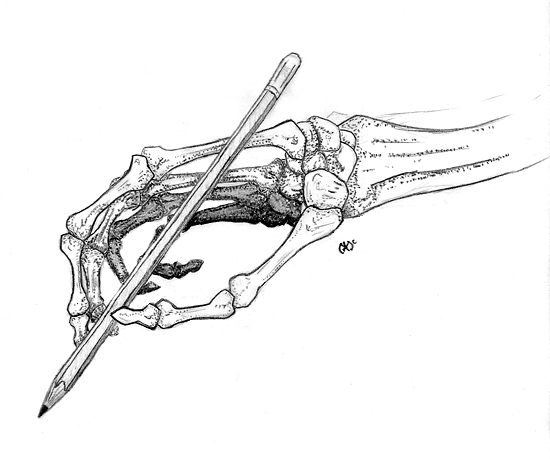
There is also a relationship between psychological healing and incantations; either repeated as a musical chant by the patient or in fact recited by the attending medicine man. Modern medicine and science of course scoff at the notion of magical incantations having healing or restorative powers as so much superstition. But this, of course, begs the question that if recitations and incantations had no evidential resort and no beneficial property then why would every single human culture have adopted the method and repeated it for several thousand years? Surely if there was nothing to vibrating air with the sound of one’s breath as well as the added stimulation of associative meaning being read cognitively by the patient’s mind; we would have given it and its sisters, singing and chanting aeons ago.
I am 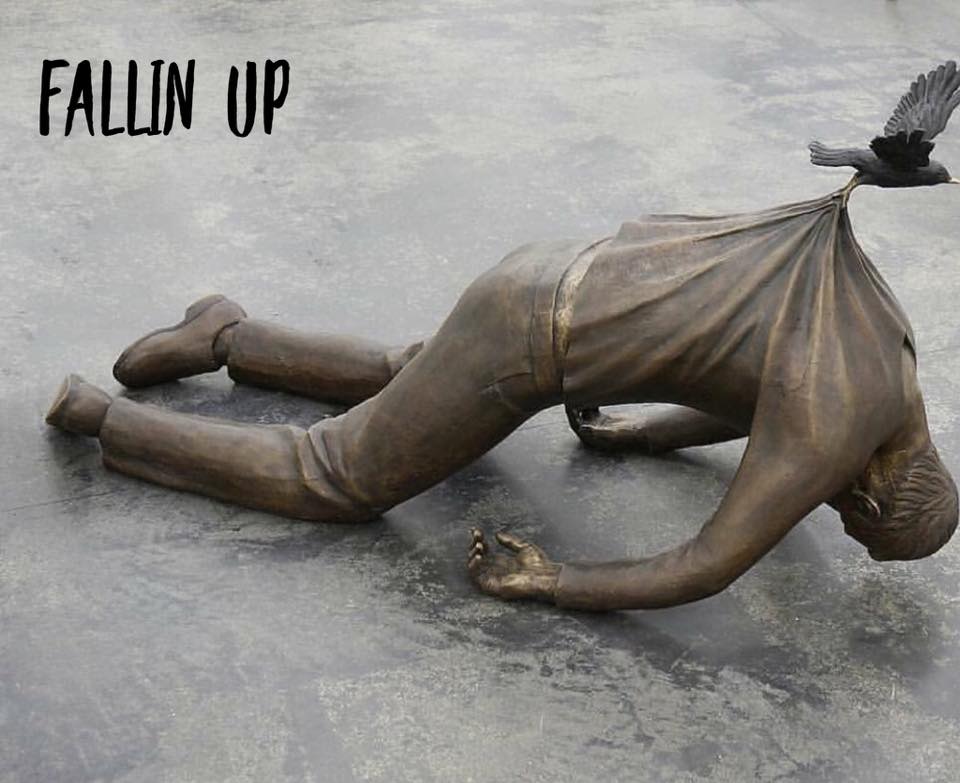 not advocating a supernatural or spiritual causation for the effectiveness of poetry as a healing agent but rather the supra-natural mystical cause which is grounded first in human nature and behavior for which can be a myriad of imprecise explanations; none of which explain why it works.
not advocating a supernatural or spiritual causation for the effectiveness of poetry as a healing agent but rather the supra-natural mystical cause which is grounded first in human nature and behavior for which can be a myriad of imprecise explanations; none of which explain why it works.
Today, poetry therapy is practised internationally by hundreds of professionals, including poets, psychologists, psychiatrists, counsellors, social workers, educators and librarians. The approach has been used successfully in a number of settings—schools, community centers, libraries, hospitals, rehabilitation centers, and correctional institutions, to name a few.
How Does Poetry Therapy Work?
As part of therapy, some people may wish to explore feelings and memories buried in the subconscious and identify how they may relate to current life circumstances. Poetry is beneficial to this process as it can often be used as a vehicle for the expression of emotions that might otherwise be difficult to express
•Promote self-reflection and exploration, increasing self-awareness and helping individuals make sense of their world
•Help individuals redefine their situation by opening up new ways of perceiving reality
•Help therapists gain deeper insight into those they are treating
• In general, poetry therapists are free to choose from any poems they believe offer therapeutic value, but most tend to follow general guidelines.
It is recommended selected poems be concise, address universal emotions or experiences, offer some degree of hope, and contain plain language. Some poems commonly used in therapy are: “The Journey” by Mary Oliver “Talking to Grief” by Denise Levertov “The Armful” by Robert Frost “I Wandered Lonely as a Cloud” by William Wordsworth “Leaves of Grass” by Walt Whitman “Turtle Island” by Gary Snyder The poetry of Alan Watt, Allen Ginsberg and others.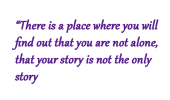
Although the selection of material is often by the therapist, those being treated might be asked to bring to therapy a poem or other form of literature they identify with, as this may also provide valuable insight into their feelings and emotions.
My Technique in Poetry Therapy
A few different models of poetry therapy exist, but the one I’ve had the most success with is a Four Phased Progression of Attention:
Recognition – Focus – Intention – Action
In the receptive/recognition phase, the poet therapist merely guides the subject to focus on their issue. The aim is to establish concentration and cognitive focus on the details of the issue which are not revealed to the poet/therapist. Only until the poet/therapist feels confident that the subject is cognitively attuned to and non verbally focussed on the problem or issue of concern that they begin to ask suggestive questions as to how the subject feels, not thinks about their subject.

This provocation of emotion usually comes in three distinct phases of emotional content:
I. First is the one of the predicament, then the subject first becomes aware of the existence of the issue. This is the gateway phase where anticipatory feelings are registered and ideally conveyed through the prompting of the poet/therapist.
II. Then there is the full throttle stage when anticipation of the issue has given way to full experience of all emotions related to the issue. This is usually overwhelming (or it wouldn’t be “an issue” in the first place), and it is tantamount that the poet/guide leads the subject through distinct words to describe the layers of emotions experienced by the subject. Language and the use of the words is the key here because emotions always come in clusters of complexity that make it difficult for both poet/therapist and subject to distinguish and focus on underlying and suppress emotions.
“What kind of anger do you feel?”
“How would you describe your sadness”
“How much shame do you feel?
“What would you compare it to?”
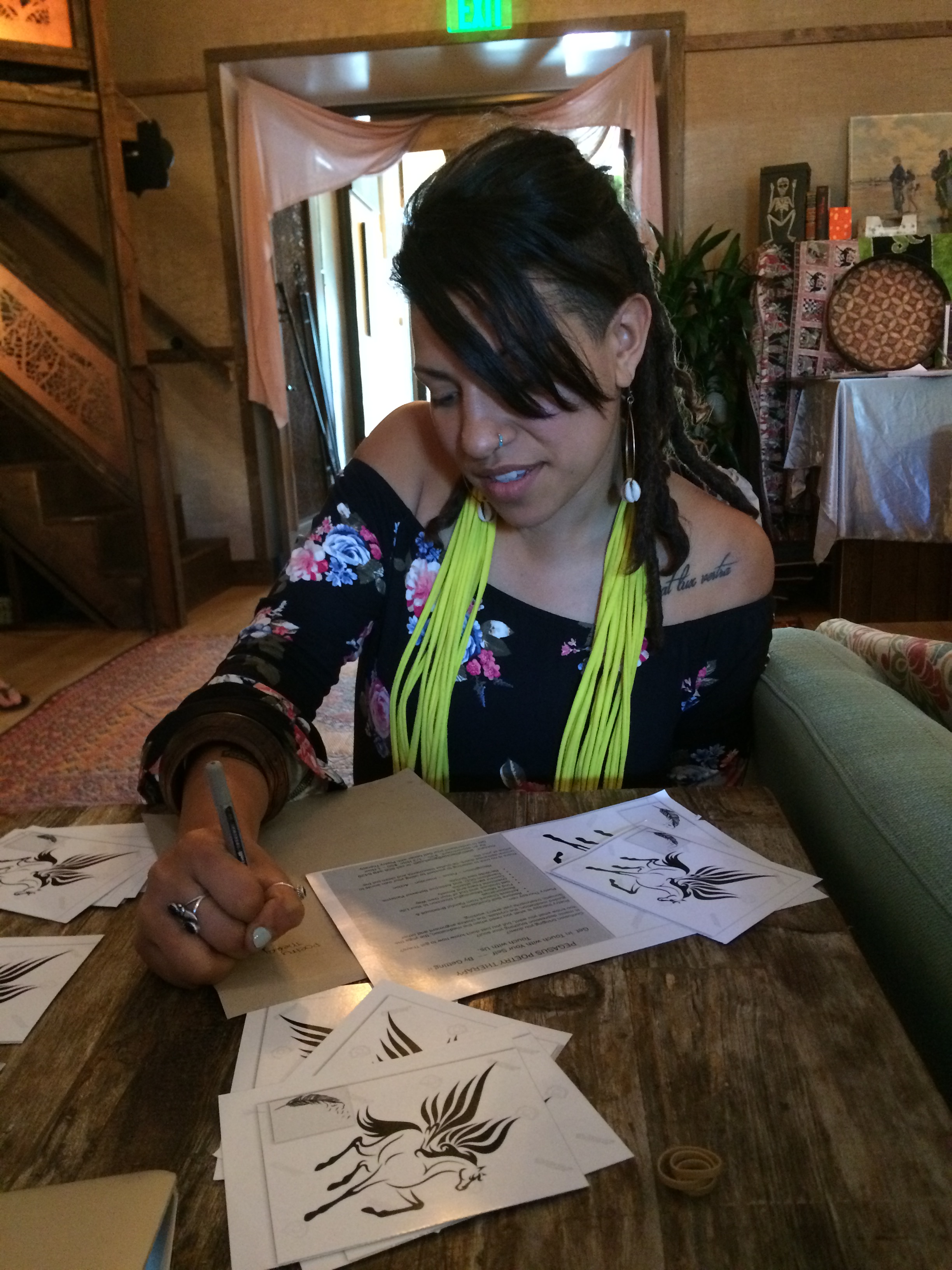
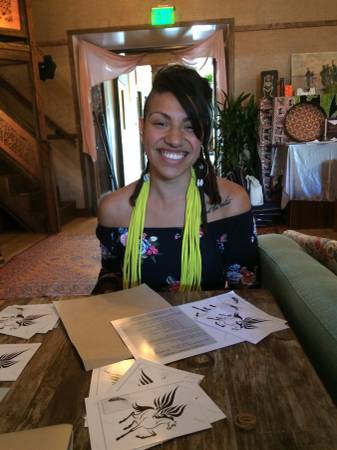
Are typical of the questions a poet therapist would ask the subject.
This is a sophisticated method of word association but rather than creating bridges between seemingly disparate words, the goal is to drill down to the core emotions about the issue by uncovering and refining the language the subject has chosen.
Achieving exactitude of description is the task at hand. The Poet/Therapist makes careful notation of everything the subject says towards describing their emotion. It is important to keep them focused and not to succumb to intellectual distraction. Thoughts are illusions, emotions are facts.
Getting the subject to correctly and precisely describe the emotional facts of the matter at hand is the objective
III. The final phase is the exit strategy.
How do the feelings commence to recede? How does the issue recede back into the background? What are the parting emotions? Is there anxiety about the leaving? The anticipation of an issue yet unresolved? Or is the issue impermeable and subject to a rhythmic return?
Again, the subject’s wording, their adjectives, adverbs and phrases are the material of the poem.
At this point, there is usually a short break to give time for the subject to recover from the emotional transitions and for the Poet/Therapist to briefly skim their notes and begin to focus on the flow of adjectives. It is preferable if possible, to compose what amounts to a first draft, a flow of words which the poet can read back to the subject to confirm the accuracy of the flow.
At this first reading stage, it is possible to start interjecting logical bridges between the emotional descriptors. This is the creative factor unleashed. The Poet must be led by the subject to link coherent sequences between the emotional states. The poet suggests and the subject confirms or vetoes the phraseology, one line at a time.
Now we arrive at a second draft which is the property of the subject. It is their poem for which it is crucial that the subject now read the poem aloud and take ownership of its content. The subject can redraft the poem a third time in making it their own. But the physicality of uttering the words they have chosen to express their emotional state is an act of ownership and closure.
The Poet/Therapist can either email the finished poem to the subject, hand them his/her notes or rewrite the poem into a legible form. In any case, it is important that the Poet/Therapist ascribes the authorship of the poem to the client. If the client is hesitant to put their name to the poem than something is lacking in the poem and must be redressed or indeed started over again.
The key to the entire exercise is freedom of expression, honesty and then refinement; exacting the poem.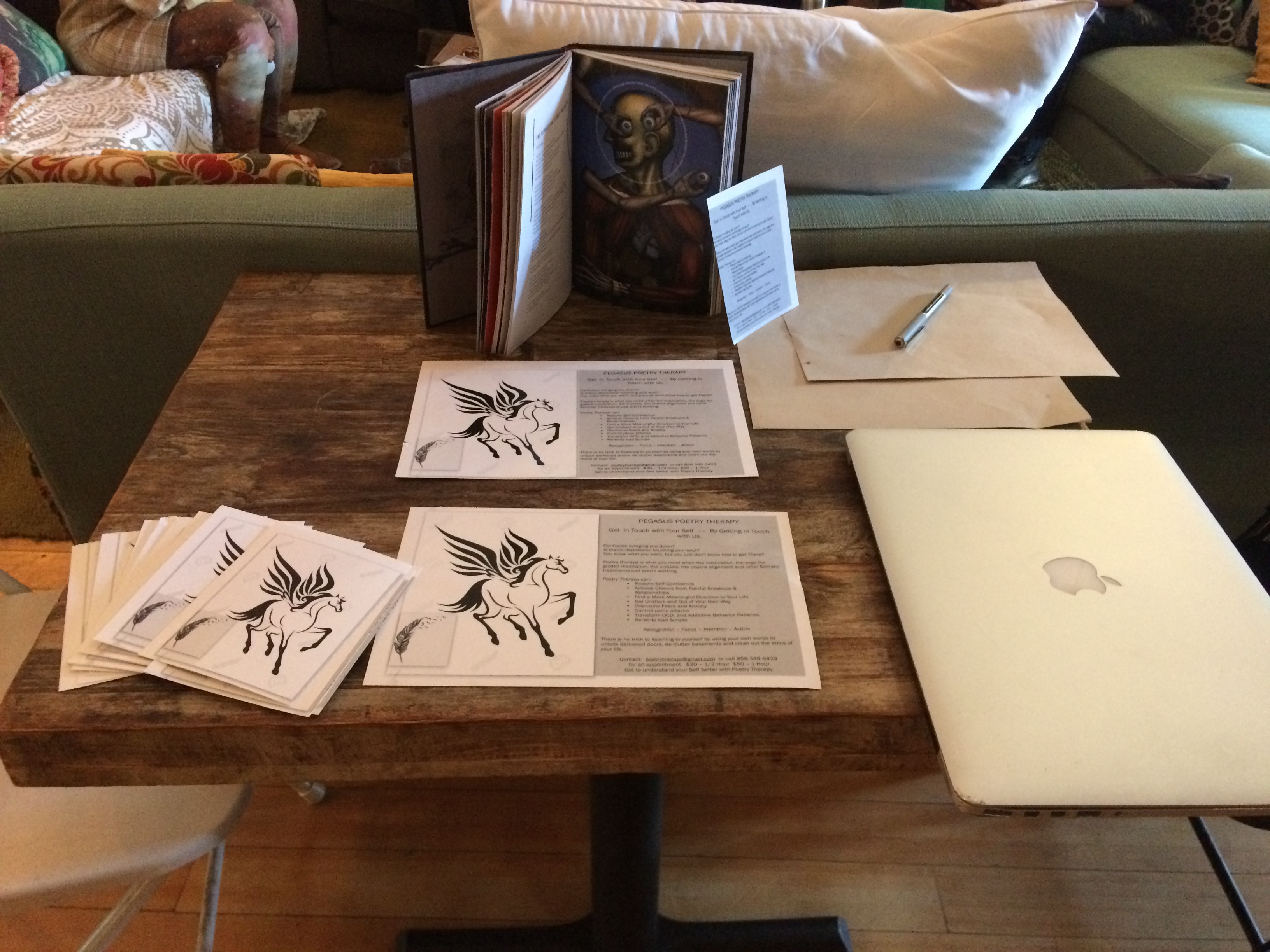
Other Approaches and Other Models
The process of writing can be both cathartic and empowering, often freeing blocked emotions or buried memories and giving voice to one’s concerns and strengths. Some people may doubt their ability to write creatively, but therapists can offer to support by explaining they do not have to use rhyme or a particular structure. Therapists might also provide stem poems from which to work or introduce sense poems for those who struggle with imagery. A Poet/Therapist might also share a poem with the individual and then ask them to select a line that touched them in some way and then use that line to start their own poem.
In group therapy, poems may be written individually or collaboratively. Group members are sometimes given a single word, topic, or sentence stem and asked to respond to it spontaneously. The contributions of group members are compiled to create a single poem which can then be used to stimulate group discussion. In couples therapy, the couple may be asked to write a dyadic poem by contributing alternating lines.
The symbolic/ceremonial component involves the use of metaphors, storytelling, and rituals as tools for effecting change. Metaphors, which are essentially symbols, can help individuals to explain complex emotions and experiences in a concise yet profound manner. Rituals may be particularly effective to help those who have experienced a loss or ending, such as a divorce or death of a loved one, to address their feelings around that event. Writing and then burning a letter to someone who died suddenly, for example, may be a helpful step in the process of accepting and coping with grief.
How Can Poetry Therapy Help You?
Poetry therapy has been used as part of the treatment approach for a number of concerns, including borderline personality, suicidal ideation, identity issues, perfectionism, and grief. 
Research shows the method is frequently a beneficial part of the treatment process. Several studies also support poetry therapy as one approach to the treatment of depression, as it has been repeatedly shown to relieve depressive symptoms, improve self-esteem and self-understanding, and encourage the articulation of feelings. Researchers have also demonstrated poetry therapy’s ability to reduce anxiety and stress in people.
Those experiencing post-traumatic stress have also reported improved mental and emotional well-being as a result of poetry therapy. Some individuals who have survived trauma or abuse may have difficulty processing the experience cognitively and, as a result, suppress associated memories and emotions.
Through poetry therapy, many are able to integrate these feelings, reframe traumatic events, and develop a more positive outlook for the future. People experiencing addiction may find poetry therapy can help them explore their feelings regarding the substance abuse, perceive drug use in a new light, and develop or strengthen coping skills.
Poetry writing may also be a way for those with substance abuse issues to express their thoughts on treatment and behavior change. Some studies have shown poetry therapy can be of benefit to people with schizophrenia despite the linguistic and emotional deficits associated with the condition. 
Poetry writing may be a helpful method of describing mental experiences and can allow therapists to better understand the thought processes of those they are treating. Poetry therapy has also helped some individuals with schizophrenia to improve social functioning skills and foster more organized thought processes. It is important to note in many instances, especially in cases of moderate to severe mental health concerns, poetry therapy is used in combination with another type of therapy, not as the sole approach to treatment.
Training for Poetry Therapists Poetry therapists receive literary as well as clinical training to enable them to be able to select literature appropriate for the healing process. While there is no university program in poetry therapy, the International Federation for Biblio-Poetry Therapy (IFBPT), the independent credentialing body for the profession, has developed specific training requirements. Several studies support poetry therapy as one approach to the treatment of depression, as it has been repeatedly shown to relieve depressive symptoms, improve self-esteem and self-understanding, and encourage the expression of feelings.
Concerns and Limitations of Poetry Therapy
In spite of its widespread appeal and broad range of application, some concerns have been raised about the use of poetry therapy. Some critics have pointed out it is possible for people to analyze a poem on a purely intellectual level, without any emotional involvement. This type of intellectualization may be more likely when complex poems are used, as a person might spend so much time trying to decipher the meaning of the poem that they lose sight of their emotions and spontaneous reactions. Poems that are unoriginal or filled with clichés are unlikely to stimulate individuals on a deep emotional level or challenge them to think in ways that promote growth. Just always keep in mind that poetry therapy may have little or no value for those individuals who simply do not enjoy poetry.
The Advertising Pitch:
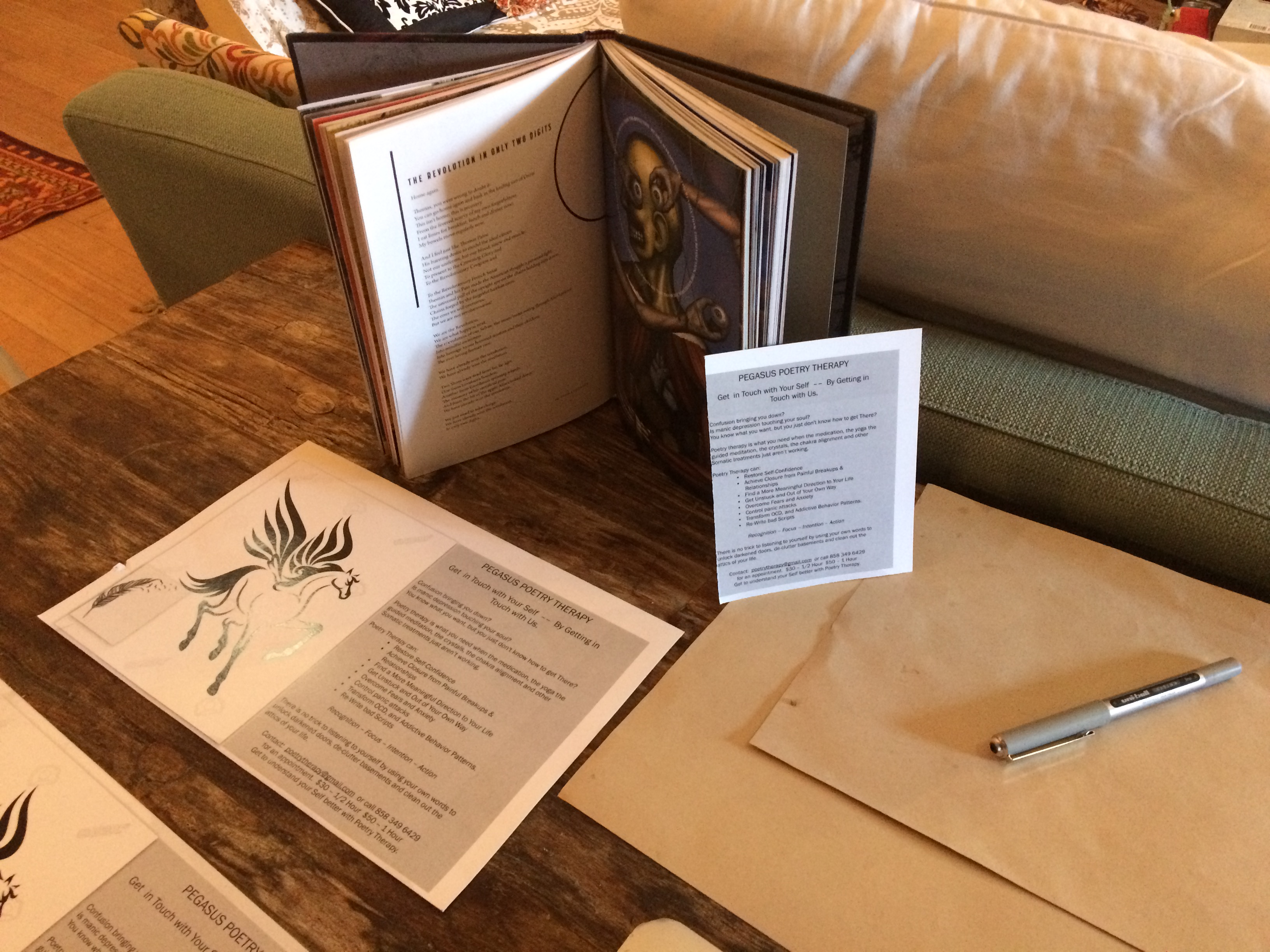
Words are the Most Powerful Magic There Is
Sometimes Your Mind Has a Will of Its Own
With PEGASUS POETRY THERAPY you can
Learn How to Read Your Own Mind!
Confusion bringing you down?
Is manic depression touching your soul?
You know what you want, but you just don’t know how to get There?
Poetry therapy is what you need when the medication, the yoga, the guided meditation, the crystals, the chakra alignment and other Somatic treatments just aren’t working.
Some things only work when you let them work:
• Restore Self-Confidence
• Achieve Closure from Painful Relationship Breakups & Lost Loved Ones
• Find a More Meaningful Direction to Your Life
• Get Unstuck and Out of Your Own Way
• Overcome Fears and Anxiety
• Control panic attacks
• Change Addictive Behavior Patterns, like OCD
• Re-Write bad Scripts
Recognition > Focus > Intention > Action
 There is no trick to listening to yourself and learning how choosing and rearranging your words can unlock darkened doors, de-clutter basements and clean out the attics of your life. Sometimes in merely one session.
There is no trick to listening to yourself and learning how choosing and rearranging your words can unlock darkened doors, de-clutter basements and clean out the attics of your life. Sometimes in merely one session.
Every Tuesday from 11:00 am until 6:30 pm at the
Inner Temple Inner Healing Center
at Eve’s Vegan Cafe 575 S. Coast Highway 101 Encinitas, CA
Contact: realpoetrytherapy@gmail.com or
Call 858 349 6429 for an appointment.
$50- 1/2 Hour $80 – 1 Hour 
EXAMPLES & ENDORSEMENTS
PEGASUS POETRY THERAPY has only recently launched its online version via FaceTime, Skype or Facebook video.  Just add <poetry therapy> to your Skype contacts and schedule a date. Payments accepted through PayPal or Facebook cash. Here are some examples of the poetry achieved through PEGASUS POETRY THERAPY:
Just add <poetry therapy> to your Skype contacts and schedule a date. Payments accepted through PayPal or Facebook cash. Here are some examples of the poetry achieved through PEGASUS POETRY THERAPY:
I.
Narcissus in a Nutshell
I’ve lost the person locked within the situation
Like a nut dwells within its hard shell of fearful anger.
Escaping vulnerability
Hiding from the unknown.
Hard shells, hard feelings, hardness itself
The excitement of living days in the present
Belonging to the past
I will not let go of what I can recall but not relive
My belonging to that which encompasses myself
Another nut within its shell.
To belong is to exist
Without belonging there is Nothing and
I fear nothing most of all because I do not know it
And I fear what I do not know more than
I would remedy the pain of this loss with trustworthy tools
When two liquids are bonded as one
A single drop of poison poisons the whole glass
And betrayal is always poison no matter how little or how much
The glass of Narcissus’s tears is now empty
He has blinded himself rather than drink his own poison.
Instead he has left me to sip the bitter poison
Of fading better days.
Like a cat
Poised in stillness
Distracted by nothing
Ready to pounce
I will not surrender the pain.
I will not surrender the pain.
Because the pain is my memory of the happiness
We’ve now lost
A sweet nut within a bitter shell.
II.
The Martyr
Last night I saw you beatify a martyr
With a magical brush of gold belief.
You were serious and determined
But your brush strokes were light caresses
On a sky blue span of canvass
As you gently coaxed another image into being.
You remind me of my mother earth
Stern in her compassion
Willing to tolerate just so much from me
Before reining in my love
With her brushes.
And where you have drawn your line
‘Be careful’, you said to me on parting
But all the care in the world could not stop
My bulb from bursting
Rendering me blind in the speeding night
But still seeing with the golden light
Of the martyr you have shown me.
III.
Snake Heart
This sadness, this hopelessness
Will not be swatted away
Nor drowned by the busy work
Of the day to day.
It persists
Even when I am submerged in my bathtub.
The warm water rising from the bottom of my lungs.
Until I lose the will to breath
And the sadness becomes anger
Rising to the very top of my horns
Of my red-hot raging exhaustion.
How good to be angry!
I used to be afraid of snakes but no longer. I am hissing from the centre of my snake-heart
As you try and step over me.
Your eyes fail to see as you tread on my tail.
On my snake heart.
On my resolution without confrontation.
Without the owning of emotion
All that’s left for us is the hissing sound of machinery.
The Woman I Never Got to Love

I never really knew Hannah Northedge apart from our Facebook exchanges. I think it was she that first started commenting on my postings. I read her comments with bemusement and replied. Earnest, sincere, a bit young girlish but always quintessentially English. That refined contrivance that is both over-mannered and elegant at the same time. And yet we shared a sense of humour, which is an astonishment between an Englishwoman and an American.
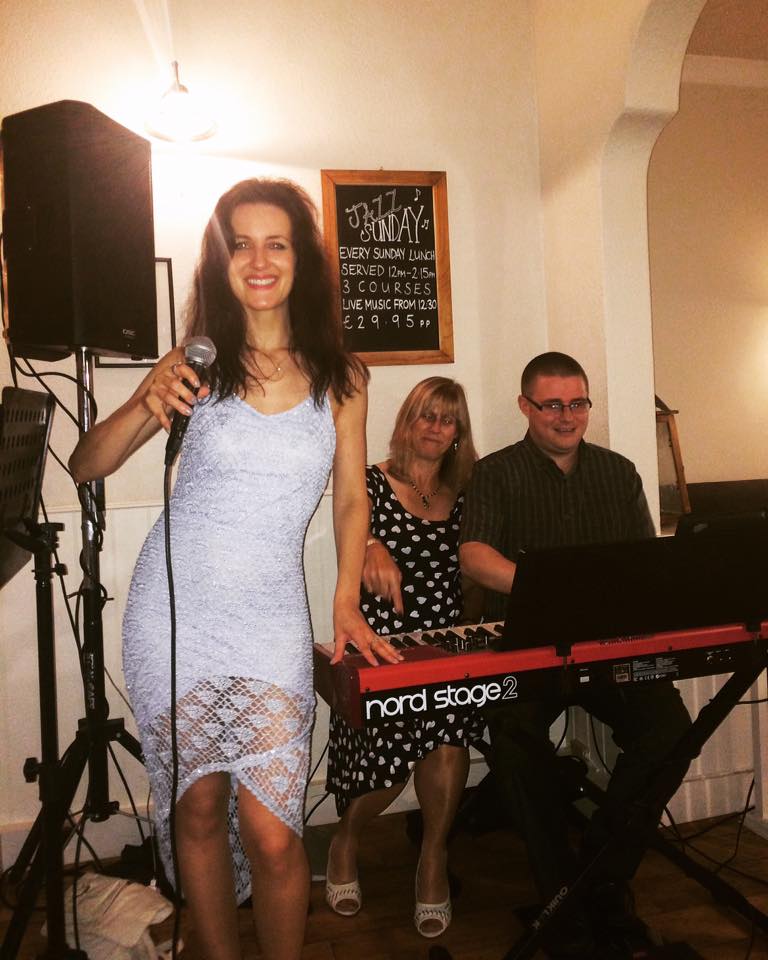 The real English, the softcenter at the core of the cracked, hard surface, English remind me no one more so than of the Japanese. Both island peoples deeply suspicious of foreign invaders and both sewn tightly within an intricately embroidered fabric of ritual, custom and politesse. Both peoples’ have a tea ceremony; one with boiled spring water and green leaf powder, the other with scones, clotted cream and jams.
The real English, the softcenter at the core of the cracked, hard surface, English remind me no one more so than of the Japanese. Both island peoples deeply suspicious of foreign invaders and both sewn tightly within an intricately embroidered fabric of ritual, custom and politesse. Both peoples’ have a tea ceremony; one with boiled spring water and green leaf powder, the other with scones, clotted cream and jams.
I did not really know Hannah Northedge but I knew what she was like. A middle-class Midlands girl from Leicester with financially nurturing parents and an early gift, really, a passion for music. She must have dreamed as a young studious girl coming to the Big Smoke, to London to make it big as a chanteuse, as a professional jazz singer. Hannah’s own cover version of Dick Whittington sans cat. This would have been for her a dream logically constructed from sturdy childhood building blocks. Each carefully poised upon the other, pushing gradually upwards into a stern, determined tower of accomplishments.
Hannah would teach music on the side, to students both male and female to make ends meet in a rapidly escalating London that had long driven me from its financial borders. Living in London is not an easy thing. Not for any young man or woman and certainly not for a high strung, talented musician intent on being the best at what she could already do quite well.
The dedication of an artist is blind. Blind to all things that do not further the acts of creation. There is no greater earthly power than to suddenly plug one’s hours, days, years of practice into an unearthly circuit that seems connected to the very essence of one’s living. That sudden bursting propulsion ever further, and ever greater into what you had always wanted to attain and seemed now to be as effortless as a second nature. Suddenly you are living your higher nature!
Any artist, any writer, any dancer and any musician will tell you that this moment of being ‘experienced’ of being played upon what feels like the very aesthetic strings of life is at best indescribable. This is much more than being “in the zone” as an athlete or card player might venture. This is about the zone being in you and all around you; in every pore and molecule of your being until it would take more effort to stop the momentum than to just let yourself keep falling forwards. Pulled into the very gravity of creation.
The Red Shoes is a 1948 British drama film written, directed and produced by the team of Michael Powell and Emeric Pressburger and based on the story by Hans Christian Anderson about a pair of red shoes that are enchanted and when worn enchant the ballerina dancer into dancing more powerfully, more perfectly than she has ever danced before. Until tragically in the end, the dancer cannot stop the shoes from dancing her to her death. A glorious death brought to life by a magical realism. One that many would gloriously surrender to just to be swept up in that dance unto death.
Hannah had no red shoes to speak of, but her throat, her lungs, her diaphragm and her instinct for music were as enchanted as they were enchanting. They were her soul and at very least they enchanted me. I never really liked what she sang. Of course I never told her that; (why would I?) To me, perhaps unfairly, it reeked of nostalgia and a wonting for a long disappeared time. Her numbers were swing, pre-integrated jazz; the time of Louis Armstrong and grinning happy black men.
This music came to England via the American GIs that were stationed there, much to the resentment of the male British population and much to the erotic delight of the female one. Courting and bedding an English girl was the kind of overseas exotica an American GI could handle, easily overlooking the cultural gap by virtue of a common language; in fact magnetically attracted by that difference of language and nuance. We said elevator, they said lift; we asked how many blocks; they answered how many streets; what could be more enchanting? All to the sound of swinging jazz.
Hannah in many ways embodied that stalwart and determined optimism of the English. Being bombed by a vastly superior air force, on the very brink of invasion and yet somehow, against every indication to the contrary, still anticipating a break in the weather. Raining bombs on old London town. By the time American GIs were deployed to England the response of the British and I can hear Hannah saying exactly this, was “About bloody time! How nice of you to finally show up for the party!” “Better late than never, I suppose!”
This was the playful sarcasm of the English by which they kept themselves and each other bemused whilst coping with the obstacles at hand This has always been lost on my American comrades. We think it’s rather mocking, which of course it is; it’s merely a democratic mockery, a Monty Python hysteria at the awesome absurdity of Life and it all. When it comes to jokes and putdowns and the English, no one ever gets out alive, no less so than the English themselves. Self-effacement and self-mockery are not part of the American skill set and we would be fortunate in having few English Life Coach instructors to teach us a thing or two about the proper positioning and placement of the ego.
But I digress from my digression. Hannah was quintessentially English, youthfully so. Although merely some ten years younger than me, she somehow always made me feel that she was much younger than that. A child’s wide-eyed openness beaming from a woman’s face I believe that that child-like disposition, as well as her nervousness and constant stress, were hand in glove with her talent. She desperately needed to keep performing, to keep belting out those numbers because her life really did depend on it.

I was supposed to take Hannah out on a date this Spring in London. Not really a date, more like a shared joke. Both of us had frequently traded our frustrations with the opposite sex and one night I asked Hannah to describe her perfect London date to me. It involved dinner and dancing and her description was so lighthearted and life-affirming fun that I immediately promised her that as soon as I got to London I would take her out on that exact same date. I made that promise not to impress Hannah or woo her but because what she described sounded like such god damn fun that I wanted in on it! Hannah’s lust for life was infectious. Most important of all, Hannah laughed at all of my jokes, even the ones that didn’t merit laughter.
Alas, our date to laugh is not to be. The one woman in 3 years who had finally agreed to go out with me, drowned herself instead at the very prospect. Now that’s a good joke. One that Hannah would have heartily laughed at.
What can I say about suicide? And I understand as of late through a mutual friend that that is exactly what Hannah Northedge had planned in advance and self-executed (so to speak). Albert Camus said that the only question worth asking in life is whether or not to commit suicide; each and every morning when we awake we should ask ourselves that very same question. Because in all honesty, in asking ourselves that question we are never freer. Simply because if we do not choose to end it all; (and I assume that anyone reading this has chosen other than that), then what we have chosen is everything else instead. Because we could have chosen the only alternative to living there is, but we did not to.
I don’t know if Hannah asked herself that very question waking in her luxurious hotel room in Eastbourne, near Beach Head, Britain’s top suicide spot. She certainly had chosen a fine hotel in which to waylay her return to London. Perhaps I will pay that hotel a visit just to catch that final view of the sea we might have shared and toasted. I do not know what state of mind she was in when her parents sent her back home to London from her childhood home in Leicester. English parenting can be harshly stoic at times.
All I do really know for sure about suicide, and in fact, that is what Hannah committed herself to, is that it is an act of self-agency. You may not want to hear this, but please listen because it’s true. Take this bitter pill from one who knows: Suicide is a determined act to strike out against a world of pain and futile injustice. It is not weakness nor surrender that causes one to take one’s own life. It is instead the ultimate act of defiance, an act of unnatural courage and entails a great act of will against all instinct; against the very will to survive.
To look at the universe that gave birth to one’s own conscious mind and in full consciousness scream “No!” “No, this life was not worth the pain, the agony, the empty suffering of my existence!” “You can just take it, just have it all back”. “This was never going to be good enough and I’m putting an end to it here and now because it is my choice my freedom, my volition to do so!”
I do not know of Hannah’s pain apart from what she told me of it. I do know that her despair at romance and at its betrayal weighed heavy on her. If there is any lesson to be garnered from her passing, be it what I tell my own daughter time and time again: never ever believe that you will ever need a man to be happy as a woman.
It’s possible to have both, but by no means mandatory; nor is a man ever the sole path to happiness. We are at best unreliable and at worst, much worse than that.
Hannah did seem determinedly desperate in her remaining months; determined to be believed and desperate not to be dismissed as a hypochondriac lunatic. Which from my own experience with medical authorities. their tendency to treat the symptoms more urgently than the patient surely is lacking some benefit.
I know that there are those of us who in trying to find some salve for our confusion and our anger will demand answers from doctors, from landlords and mould experts; from Hannah Northedge’s own family, even. I know that righteous confusion first hand. To you, I say what my baby sister’s widow said to me at the time of her untimely passing: “nothing that we do, nothing that we try, no matter how hard is ever going to bring her back”.
We need all to find our peace with that.
Igor Goldkind © 2018
The Holocaust Survives

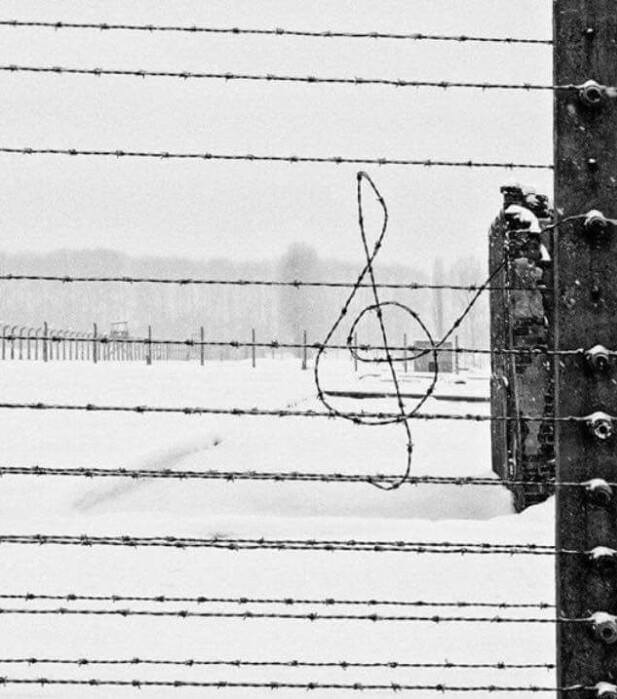 No other single event in history had more of an impact on the 20th century and by consequence the present 21st, than the mass brutalisation of families or men, women and children in the camps and now in the Syrian refugee camps in Lebanon.
No other single event in history had more of an impact on the 20th century and by consequence the present 21st, than the mass brutalisation of families or men, women and children in the camps and now in the Syrian refugee camps in Lebanon.
L’Chaim
Master of Puzzles
By Igor Goldkind
Ivan Moscovich has created more brain-teasers than most people have solved crosswords. Igor Goldkind set out to piece together his fascinating and harrowing life.
Ivan Moscovich has his life’s work wrapped up in a bundle of about 10,000 pages of A4 paper. On those pages there are some 5,000 separate puzzles, puzzles that range from the hang-on-let’s-look-OK-I-see to beyond the fiendish. Some are variations on themes, some utter one-offs. Some are to be made on paper or card, some are designs for tricky little – or big – devices. Moscovich calls them the S.A.M. archive – science, art and mathematics. The puzzles use the techniques of bafflement to teach, and they use beauty to bemuse.
Moscovich has been making puzzles since the 1960s. Now, at the age of 70, he’s looking to transform that life’s work into new formats. He and his colleagues have started up a new company to take the ideas on those 10,000 pages and put them to work in the digital arena. Moscovich is sure that there is room for them. Having looked with interest at hits like Seventh Guest, which friends told him were bringing new life to the world of puzzles, he was profoundly unimpressed. The puzzles were hard, sure (if you weren’t Moscovich, that is), but they were variations on a small number of underlying tricks, and they didn’t add up to more than just a set of puzzles. Moscovich thought that he – or people mining his archives in digital form – could do better.
“In digital media you can build overlapping linear trees, using the media to interrelate the concepts for the user. It’s important with any problem to see – at the same time – the different paths that can take you to a solution. Certainly this is the best way to explain scientific and mathematical concepts.” The collection of puzzles becomes a sort of puzzle itself: a maze, something to find one’s way through, something more than the sum of its parts.
Ivan is looking forward to trying to put all this into practice – not least because he enjoys the attitude of the people he’ll be working with. The way that games designers and programmers think fits into his world perfectly. He loves to be with people who are bored when they’re not trying something new, even impossible, when they’re not seeking a new solution. And he can make sense of himself by being part of a group; in fact, it has saved his life before now.
Ivan likes people who try to make sense of the pieces. That, in part, is how he got into puzzles – his delight in their ability to teach eager minds. As well as making puzzles for books and toys, he has used them as serious teaching tools for engineers – and pioneered the art of transforming the counterintuitive insights of puzzling into science museums with interactive displays. Putting together the pieces of an idea is much more important than putting together the pieces of a puzzle. The wonder is that by getting someone to do the latter, you can let them do the former.
A life in fragments
Moscovich’s own life is a bewildering array of puzzle fragments. Having met him on a CD-ROM project and learned some of his history, I started to wonder how to reassemble the fragments – and what they could be made into. One of the answers is a charming, brilliant septuagenarian. Another is 10,000 pages of A4. And a third might be a technological passage through the 20th century, from the industrialisation of death to the pursuit of pleasure. A journey that charts the territory of the 20th century’s technological revolutions and its human upheavals, from the Balkans to California, from museums to the Israeli defence industry, from the ruins of Austro-Hungary to the digital age, from railways to death camps.Moscovich’s parents were Hungarian, but he was born in Novi Sad, a small Serbian town. He still retains a central European accent that, to my ears (and probably to yours) sounds like the definitive voice of modern science and mathematics. “My father was a Hungarian who escaped from Hungary into Yugoslavia after the First World War. He was a painter by profession, but in order to make a living at that time he opened a photographic studio which became very successful. He named his studio Photo Ivan, after me.”
His description of an everyday childhood in Novi Sad paints a familiar
portrait of a middle-class craftsman’s family, complete with Yiddish grandmother and old-world family meals – and none of the hothouse intellectual atmosphere that produced Leo Szilard, John von Neumann, Kurt Gödel and other thinkers who left Budapest to dominate 19th-century thought. There was little to suggest Ivan’s strengths in science or mathematics – except, perhaps, a boyish infatuation with model aeroplane kits. He had, however, inherited from his father an inclination for drawing, and his father’s habit of tinkering with various gadgets – including an early air brush – to enhance his pictures was a constant delight to Ivan.
But when he reached technical high school, Ivan fell under the influence of a mathematics teacher given to explaining the precepts of science by means of science fiction. Ivan’s teacher opened up the world of mathematics by making problem solving fun. Ivan was entranced by the maths – and, later, showed that he had learned the method, too: rigorous scientific thinking through the lens of art and storytelling.
By then, though, the Hungarian fascists had invaded. They met with little resistance. And, soon afterwards, they took Ivan’s father from him. “Before they took him, he asked a Hungarian officer if he could say goodbye to my mother and in their final embrace he slipped this ring onto her finger.” Ivan holds up his hand and shows me an ornate gold band studded with eight small diamonds. It is the only surviving memento of Ivan’s youth; everything else was lost in the Holocaust. Ivan’s father joined 6,000 Jews and 4,000 Serbs executed en masse and thrown beneath the ice of the frozen Danube. All in one day.
Ivan continued his studies until the end of 1943, when the Hungarians “got cold feet” and the Germans invaded. “We really didn’t have any knowledge of what was happening in Poland in the ghettos or with the Nazis. We all hated the Hungarian fascists, but I still knew and liked Germans and, you know, communications were very different then; telephones didn’t work internationally. We were really disconnected from the rest of the world.”
When a Hungarian Jew escaped from Auschwitz and fled to Budapest to warn the Jewish community of the death camps, few believed him. So Ivan Moscovich was deported to Auschwitz at the age of 17.
“It meant stepping out of one world into another one. I was sent with my grandfather, my grandmother and my mother. When we arrived, my grandparents were immediately taken to the crematoria. My mother stayed in Auschwitz the whole time. After three or four weeks I was taken out of Auschwitz into one of the surrounding work camps. Young people were sent to work. I worked at laying rail lines.” The Nazi system was to provide rations for six months survival, after which the workers were supposed to starve to death in order to make room for new inmates. The meticulousness by which the operation was organised was not lost on Ivan. Nor would the memory escape him when two years later he found himself again working on train rails.
By that time he and, miraculously, his mother were back in Novi Sad. An acquaintance in the Ministry of Transport offered him a research position in the effort to repair Yugoslavia’s war-torn railway system. The post involved testing an enormous German machine that used high electrical wattage to weld rail lines together, a then untested invention. Mounted on a train carriage, Ivan travelled with the machine throughout Yugoslavia, in charge of the welding team. The machine was so successful that Ivan soon found himself elevated to a lofty position within Tito’s Ministry of Transport, accountable only to the deputy minister himself.
“There I was, a simple technician, at the age of 20, and I had all this power and no boss, really. People thought I was a top-shot communist because everybody had to do exactly what I wanted. The project became more and more successful, our production was way up and I was given orders to enlist more and more technicians for my team. One day I was called in by the deputy minister and was told that in order to create a 24-hour work shift, I was to take on 50 German prisoners of war.”
So, two years after surviving the German work camps, he was given control over a work team comprising high ranking German officers and regular soldiers, some Wehrmacht, some SS. He could have done anything he wanted. He could have shot them all and easily justified his actions to the authorities. He could have tortured them to death with gruelling work. He could have snapped his fingers and made them all disappear. But Ivan Moscovich had responsibilities, a quota to fill and a marvellous welding contraption to keep running.
“I had ten kilometres of rails to get out that week and it was a real dilemma whether to screw the Germans or to try to get the best output from them. I decided to increase their rations to get more work out of them, and sure enough they were grateful and worked even harder, which increased the output. I was very, very tough with them and I think they were scared of me. But I never revealed to them that I was a camp survivor. They worked for six months and then Tito released the prisoners.”
As it happens, Moscovich only worked on the German railways for six months. “I was lucky for the first six months. It was very important for survival in the camps to be with your people, your clan of friends and family;
it made life easier. You couldn’t get ill, because that meant execution, but curiously, if you could show a work-related injury, a visible wound, you could be seen by the SS and granted a day or two of hospital. One day I announced myself with a bad wound. While everyone else went on work detail I was left in the enormous courtyard with a broom to clean up, completely by myself. Suddenly the gate opened and a commandant’s car stormed into the courtyard and headed straight for me. The German officer jumped down from his car, grabbed me by the scruff of the neck, threw me onto the platform of the vehicle and drove off. I was kidnapped.” Later Ivan learned that there had been an escape from a neighbouring camp and the camp commandant had stolen Ivan to make up his tally of inmates. The mathematics of death had to add up.
“Up to this point all of my feelings had been one single feeling: an enormous outrage. Rage that somebody, anybody, another power, could take me away from my decisions, my everyday life, and put me in an environment where whatever happened was not under my control. I was young and maybe too strong an individualist, but it was rage that kept me alive.” In the new camp this life-sustaining anger was broken, until he discovered a distant
Hungarian cousin running the camp’s kitchens and being the “godfather” of the camp. Then he found some school friends of his father’s. For several weeks Ivan rebuilt his spirits and his body. Then the Russians pushed back the German line, and the SS made their lethal preparations for evacuating Auschwitz.
The problem to solve was – how to survive.
The Museum Man
In 1952 Ivan found a new clan – and became a leader. He set out for Israel to join his now remarried mother. On the boat to Haifa, Ivan was approached by Israeli officials interested in his skills and qualifications. The new state was hungry for skilled technicians. By the time Ivan reached Haifa he already had a position in the Ministry of Defence waiting for him. “In my group there were mainly these Yugoslav and Hungarian technicians without any training in science and mathematics. The language problem was enormous, and here was this group of technicians involved in scientific research without any basis in the field. I don’t know how it happened, but I was selected as someone who could teach the other members of the group some basic science.
My boss wanted me to instruct them outside of a formal classroom using demonstrations, models and visual means. That was really the start that put me in the direction of puzzle making.”Ivan found himself playing around with visualisations and experiments. He worked hard to come up with ways in which complex ideas could be explained visually, not so much to convey a deep academic knowledge of science and mathematics but to engender an intuitive grasp of the subjects and, most important of all, to instill the knack of problem solving needed to tackle more important scientific and technological puzzles.
By the end of the 1950s, Moscovich was creating puzzles almost all the time, and practice had revealed a rare gift for making puzzles that could be revisited, puzzles that retained a depth, an impact, even after they had been solved. “I tried to design models that were compact and effective, and in which the experiments could be repeated a number of times. This required completely original design conceptualisations. My boss, Ernst David Bergman, was the leading scientist in Israel at the time, and founder of the Weizmann Institute. He loved my work, and it was he who had the idea that some of those objects I had designed could be exhibited. That was the basis of the founding of a science museum.”
In 1959 Tel Aviv established its Museum of Science and Technology, the first of its kind in Israel. Ivan worked non-stop for two-and- a-half years converting five disused British barracks into a museum, begging and borrowing every available resource. The museum finally opened in 1964 with Ivan as its curator and director. It was the first science museum to emphasise hands-on, interactive exhibitions, and it quickly attracted international attention. His position as curator became a springboard from which to explore and express his interest in art, science and mathematics, and to do it all with the benefit of a growing international reputation.
In 1965 Frank Oppenheimer, brother of the more famous Robert, having heard of Ivan’s fantastic museum to science, visited Tel Aviv with Admiral Lewis Strauss, chairman of the US Atomic Energy Commission. The two became fast friends, sharing a childlike fascination for technology and science as well as knowledge of the darker side of machines and technology. This was four years before the opening of the Exploratorium in San Francisco, for which Oppenheimer imported many of Ivan’s installations. Some remain on exhibit to this day.
The puzzle of death
In 1944, while Oppenheimer was working with his brother on the problems of designing the first atomic bombs, Moscovich was on the death march to Bergen-Belsen. Here, too, the problem was how to survive. “Everybody said those who stayed, declaring themselves ill, would be shot. As it happens, they were liberated by the Russians two weeks later. And we walked barefoot and nearly naked through the worst winter of the century, westward to Bergen-Belsen.”At Bergen-Belsen, the last stop for the Final Solution, Ivan gave up all hope. He had been assigned to a work detail in the then still beautiful city of Hildesheim, near Hanover.
“Near where I worked was a statue of the mathematician Leibniz with beautiful writing on it.
And it was so strange that after so long in hell, I am seeing that statue. I felt I was being visited by a ghost, an image of the real world I had left behind. It was then, only then, that I remembered my previous life, my teachers, my studies of mathematics and all that. Up till then my memories had been blocked out. It’s impossible to imagine that every minute, every second of life in the camps, you were only thinking of survival; there was no room for any other thinking. But here was this beautiful statue of Leibniz that reminded me of the real world.”After two weeks working in Leibniz’s shadow, “I heard this strange noise … mmmmmmmmmmmm … that filled the air, and we suddenly realised that the sky was filled with planes. The next second everything was on fire. It was the Allied carpet bombing of Hildesheim. I saw German soldiers burning, running, and everything became chaos. I ran. After a while I stopped and looked back at the city, which was one big torch. I found myself alone in a giant field, a free man. But a free man in pyjamas, a free man with nowhere to go. I weighed 45 kilos.” Ivan turned around and started walking back to the depot. With his camp clothes, his inverted mohawk, there was nowhere to run. A German woman ran out of her house and thrust a chicken leg into his hand; she never said a word.
Recaptured, he was beaten and sent back to the camp. The dead lay in their thousands. “One barracks the Germans were using to fill with dead bodies, hundreds of dead bodies. After work one evening, I decided that instead of going back to our sleeping area that I would crawl to the top of this mountain of bodies and find myself a horizontal place. There was a slot at the top where I could see what was happening outside. I slept there for five, six days; I don’t have any notion about how much time passed. It was bliss to sleep; quiet and beautiful. It was no problem sleeping on a bed of a hundred dead bodies. Otherwise, I wouldn’t have lasted.
“One day I awoke from my sleep to complete silence. I looked through the slot to see the camp was completely deserted. Suddenly through the main entrance, which I had in my view, drove a single jeep with four English officers that stopped in the middle of the square. I rolled down the hill of bodies like a log and then I felt like I was running but I must have been moving very, very slowly. I was, I think, one of the very first to reach the jeep, and you know those guys were looking at us like they were seeing aliens for the very first time. Like first contact.” He collapsed into the arms of an English officer.
Moscovich was deathly ill. By the time that English officer caught up with him again, in a local hospital, he looked unlikely to survive. So the officer found a German doctor and frog-marched him to Ivan’s bedside. The Englishman pointed his revolver at the terrified doctor’s head and said, “If this patient dies here, you die here.”
Ivan Moscovich did not die – nor, at that point, did the German doctor. Ivan was transferred to a Red Cross hospital in a small town in Sweden – a town so boring, he now swears, that the local newspaper actually ran daily updates on Ivan’s weight gain for lack of more interesting scoops. Ivan describes his slow recovery as matter-of-factly as everything else.
“At a certain moment you know, the organism decided,
‘OK, we’re going to stay in this world. ”
Toy story
In the mid-1960s, as his fame grew in Israel and beyond, another new world opened for Ivan Moscovich. “I was working on a puzzle at my desk one day when one of the ushers came in and said a couple of tourists wanted to see me. I was busy and didn’t have the time. The usher came back and said they only want five minutes of your time and they wouldn’t give up. So I agreed to see them, Mr and Mrs Eliot Handler. I wasn’t very enthusiastic but we talked and then Mrs Handler said ‘I would like our chaps in California to see your puzzles; are you ready to come over to California?’
I didn’t take them very seriously. Two weeks later I received a call from a travel agent who had a ticket waiting for me to go to California to visit Mattel.”Eliot and Ruth Handler founded and owned Mattel Toys. Its twelve-storey building in Hawthorne was the centre of America’s toy industry. Sales of their Barbie dolls were colossal, but the Handlers were keen to expand the Mattel range beyond just dolls. When Ivan came out to visit them they immediately offered him a three-year open contract to create games and puzzles for US$25,000 (£16,000) a year. His “Brain Drain” puzzle game promptly sold a million copies worldwide. This success was repeated with a series of puzzles including “Play It Again Fun”, “Visual Brainstorms”, “The Brain Power Decathlon” and “The Hinge”. Soon toy and games manufacturers from Japan to Europe were clamouring for more and more puzzles from the master. Ivan Moscovich’s gift had found the most widespread of all its expressions.
Fitting together the pieces
Somehow, all these pieces add together to produce a remarkably creative man, and one with a unique vantage point. Ivan has seen countries destroyed, reconstructed and created afresh. He has faced the most utterly depersonalising totalitarianism ever attempted, and rejoiced in the individual quirkiness of children’s imaginations. At an age where most seek nothing new at all, he is embracing the digital world with the enthusiasm of a seven-year-old offered a Game Boy.
How does he see the end of the century?
“At present we are in a greater need for a fresh creative spirit than in any other period of human history. Less and less experience is being gained directly through activities. Sensations tend to reach us increasingly only after passing through layers of media filters. Children manipulate electronic gadgets and play with computers, which is all very well, but ultimately lacks perspicuity and full sensual enrichment.
I hope to create open-ended concepts that trigger chain reactions. Ideally, the player plays my game, solves the problems and is motivated to invent his or her own variations of rules, ultimately creating his or her own games, puzzles and aesthetic structures.”He has an avowed predilection for the physical. You can see it in his hands as he solves his puzzles. But Ivan sees unique possibilities in the digital world, possibilities that flow from the nature of his puzzles. “I’ve already published several books of my puzzles, but in a book you are restricted to the lin- ear progression of page after page, without much freedom. To interrelate the conceptual links between problems and solutions you need to be able to cross reference non-linearly, which is what a CD-ROM does.” After all, this is the point of his S.A.M. archive – that it combines science, art and mathematics as different paths to the same goal. The trajectories can be changed forever; the solutions will still provide the improvements of the self that Moscovich cares about.
“You know, humanity has been defined in various ways. For instance, as Homo habilis, skilful man; as Homo sapiens, wise man. I prefer Homo ludens, playful man, as the best definition of modern 20th-century human beings.” It was a hopeful definition that Johan Huizinga came up with in the late ’30s, at the time that young Ivan was learning science through science fiction – but the hope was serious and fearful. Huizinga was quite aware that playfulness had its dangerous side, and that the coming war would be a great, dark game; it was peace, he always said, that was the serious business.
These days, Ivan Moscovich is at peace. He lives a quiet life with his wife Anitta in west London. Within him, though, you can sense the machines within machines working, a vast inner factory of the abstract. It is hard to imagine him without them – even in the worst places the century’s history has to offer. I asked him whether his puzzling mind had helped him in Auschwitz, in Belsen; whether he had made his retreat into a private world of abstraction and pure thought.
“No. You know, it’s very difficult to explain, to understand. All of your time, all of your energy, all of your thinking is just focused on one thing: surviving.”
He did. And from the simple fact of survival he has pulled together the fragments of his life into a living inspiration for the rest of us – a puzzle worth thinking about.
Igor Goldkind writes science fiction, comics and essays, and lectures on technology and culture.
If you are concerned with the Syrian refugee crisis, the largest forced mass emigration of refugees since the Jews escaped Germany and Poland, there is something you can do. Inform your self through the Syrian American Medical Society who are running projects and providing medical supplies to the victims of the dictator Assad’s brutal and genocidal war against his own people.
Participate, if you live in southern California by attending a special exhibition of protest art at The Misfit Gallery in La Jolla California on April 21st.,
@ 565 Pearl Street. 92037 6-10 pm
I will be reading my published and unpublished work in the Spoken Word progamme as well as performing with The Third Act of Creation. But there’s much, much more. It’s a celebration of human rights and protest art to raise money for SAMS and also to join others in Mindful Resistance to the tyranny, bigotry and corruption in our present government and around the world. WE are THE PEOPLE, so instead of just complaining or getting depressed,
Let’s do something!
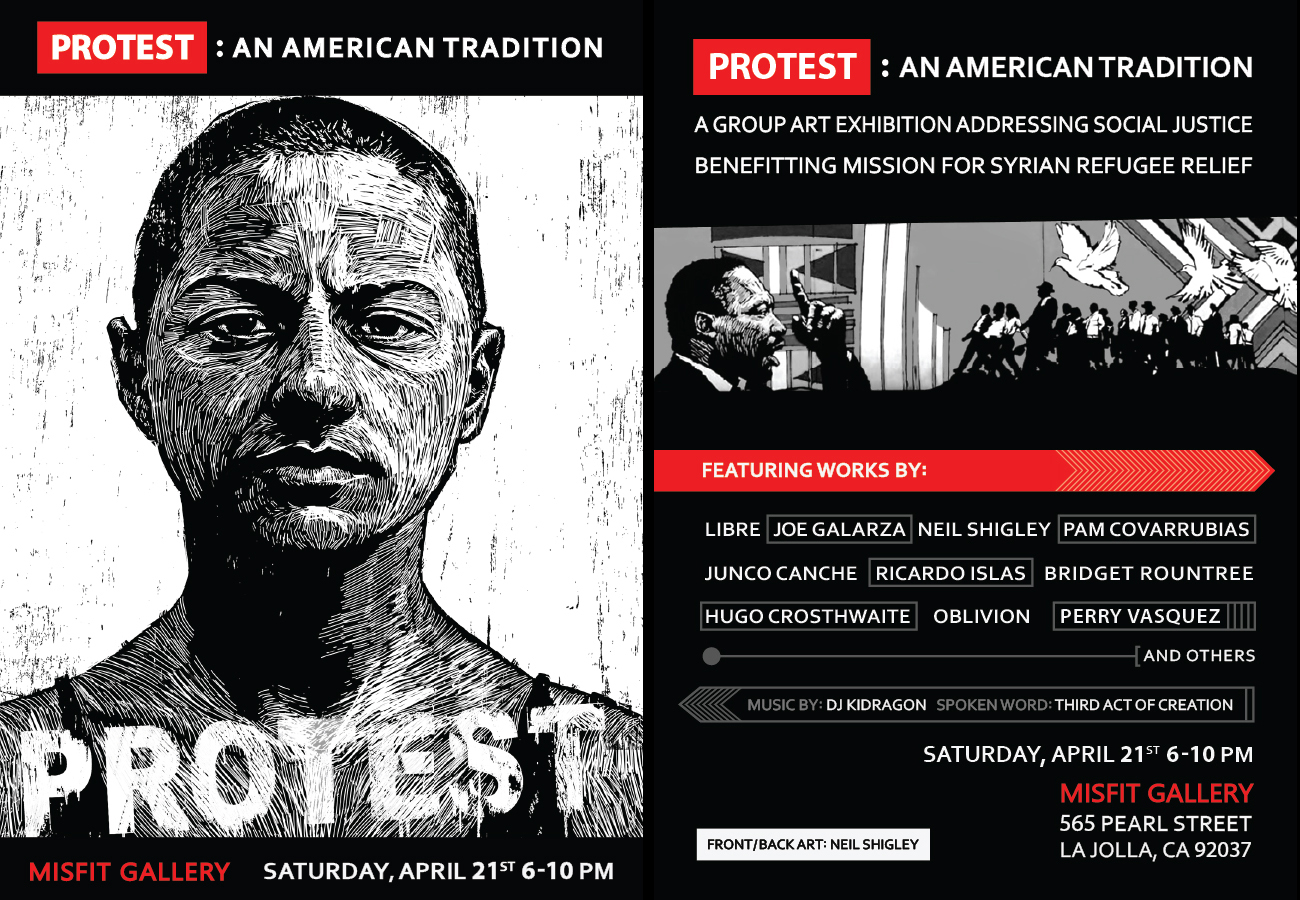

“We confuse the world as talked about, described, and measured with the world which actually is. We are sick with a fascination for the useful tools of names, of symbols, signs, conceptions, ideas and numbers.” ~ Alan Watts

The Numbers Game
In the end, it was the numbers that did us in.
They lined us up into military rows
And assigned us all numbers
One after one after one after one after one….
How many, nobody knows.
You see, it’s a numbers game
It’s all the same
You’re not your name
You’re your numbers.
Let me explain how it’s done,
And how this game can never be won.
See, there are good numbers and bad numbers
High numbers and sad numbers.
Sometimes high numbers are good and low numbers are bad
And sometimes low numbers are good and high numbers are sad.
It all depends on who is counting.
Not you or me
Not the numbers either.
They don’t know, they’re just numbers after all.
Although…
The numbers are counting on each other.
Just not you or me
Because we will never be free
Of Big Numbers and small numbers,
Negative numbers and imaginary numbers,
You see, it’s a numbers game.
It’s all the same
You’re not your name
You’re your numbers.
Let me explain
How it’s done.
And how this game can never be won.
 Prisoner number…
Prisoner number…
Credit Score number
GPA number
SAT Number
Zip code number
Blood pressure number
Heart rate number
DOB & TOD numbers
House number
Gas number
Phone number
Electricity number
Room number
Water number
Dog tags number
Social Security number
Bank account number
Table number
Sibling number
Temperature number
Flight number
License number
Vehicle registration number
Alcohol level number
Height, weight and age number
I hear you scream:
“I’m not a number, I’m a human being!!”
Sure you are,
Now take a number.
It’s for your own protection
There’s safety in numbers.
Numbers can answer all of your questions:
How far, how long, how deep, how high, how many,
How often?
Just not ‘how come’?
Anyone can count,
But you can’t count on anyone.
See, it’s a numbers game
That can’t be won
It’s a numbers game
It’s just how it’s done.
It’s all the same.
You’re not your name
You’re your numbers.
Now count to ten
And start all over again.
For Rob Thompson who asked me if Numbers occupy Space.
I Am A Paper Bag

I am a paper bag, I am.
I am only as good as what I can carry.
I am a paper bag, I am.
I’m not the smart one,
I’m not the successful one.
I’m not the tall one who always won and
Then died.
I am a paper bag.
I’m only as good as what I can carry.
I am a paper bag,
I’m not plastic or burlap, not I.
I am paper: rough, brown and thin
I’m not waterproof, you know.
And I can’t hold any liquids or gases within.
I only have the energy for stuff that really matters.
I’m a paper bag.
I’m only as good as what I can carry.
I am a paper bag.
Wrinkled and used and too often abused
Thrown on the floor.
Buried deep inside your drawers.
I am a paper bag.
I cannot ask you for anything more
I’m only as good as what I can carry.
©IgorGoldkind 2018
Nobody Talks to Me Anymore

Has been entered int the Realistic Poetry Contest and thus is no longer available on my blog as it is defined as non-exclusive or previous publication by the contest rules.
Who knows, I may even win.
Either way, it returns once the contest is over in February
Tune In.

A Drinking Song: The Ghosts of Christmas Past and Present

Last night was kind of my XXXmas eve, being a Saturday night, with no ghosts to placate until Monday morning. So I took my Victory out for a long ride, 46 miles down to Chula Vista to drop in on my drunken-angel-poet-brothers Alex Bosworth and Chris Vannoy. As I told them, I’ve never stopped in Chula Vista before, only passed through it; well on my way to crossing the border between Mexico and Madness.
Back in the Beatnik Days, when America was still a Great Shining Beacon of Golden Intentions and jail-breaking freedoms, going south of the border was a euphemism for leaving the straight rational world and exploring the psychedelic corridors and hallways of the unconscious mind, where the muses played poker to the sound of Gabriel’s saxophone under a streetlamp, playing for spare change, playing for the end of time. Kesey, Cassidy, Timothy Leary had all spent time south of the border, hiding from the authority.
But I wasn’t going all the way south or crossing any borders. Instead, like a Boddhisatva practising the discipline of worldly compassion, I was riding south on the great American highway stopping just short of going over the edge. Stopping long enough for the rest of my sentient species to hop on board and cross over with me. How long I gotta wait? The blur of the wind in my eyes transforms Inter-state 5 into a two-lane river of white headlight diamonds on one end heading towards but past me and on the other end, a torrent of glistening rubies speeding with me, flowing around me, carrying me forwards in one high speed direction.
I was carried on a slipstream of glistening rubies last night. Chilled legs wrapped around my angel in flight, carrying me aloft above all thought, beyond all hesitation, in that dangerous living moment when every half second of thought is solid and real with consequence; and any distraction is a trap door thumping open under the hangman’s rope.
That is the fury of mediation. That is my arrival in this moment that we all share. The calm at the center of chaos. Join me, dear reader, at the centre of chaos.
So I’m heading south armed with an unopened bottle of rye, the spirit of the season travels with me. Good whisky is about as spiritual as I get these days. It is my usual Xmas tradition to grab a bottle of good booze and head down to the Greyhound station, or the street corner, outside a homeless shelter or an alleyway or anywhere I can find and join a cluster of the disaffected, the homeless, the pointless, the ones left out of family portraits. Just to share a drink, a joke and the dregs of our mutual humanity.
But this year, not particularly in contrast, I’ve chosen the company of Deadbeat poets, failed self-construction workers, mental hospital misfits, suicide skippers and gravel-voiced prophets capable of predicting the present with uncanny accuracy. Cassandra’s children muttering under their condensed breaths, scratching their prophecies from the oracle down for the benefit of anyone who still remembers how to read; or how to listen. Tonight these are my brothers (and sisters), in arms. Raging against a sea of struggles, believing that by opposing them, we will end them and wrap our soiled blankets of peace around this cold, shivering world’s shoulders.
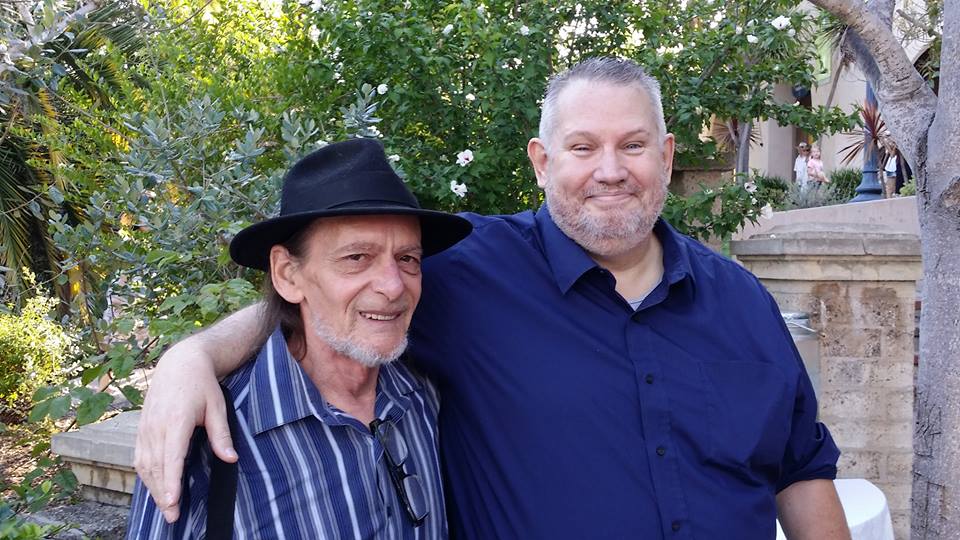
Dead Beat Poets
I make it to Main Street much too early and agree to meet my comrades in a bar called Sanctum. I have no currency apart from my still untried bottle of rye so I stand outside on the pavement near but not too near two young women smoking butts and laughing. ‘Merry Xmas’, I venture.
‘Merry fucking Xmas to you too’, is their reply. So I listen. A skill I am still mastering. The raven-haired beauty of the pair is recounting her love life to her friend. Telling her how she had met her intended’s eyes at work, a burning penetration in time and how happy she was that at least she knew, that she knew that she knew that there was an unstated passion, thrilling at the unstated, as yet unenacted attraction between them.
The bittersweet anticipation of passions yearned for but still yet to come.
I wanted to tell the dark-haired young woman how lucky she was to be free to express such yearning to another woman. Jealously, I wanted her to pity my poor lame masculinity and the political mindfield I had to traverse to even come close to sharing such a pure moment of true emotion and affection. But I didn’t. Who wants to hear another pitiful man’s story anyways? This was the year of raised female voices. Voices raised in anger, in righteous retribution for all the wrongs accrued., in demand of recognition. Voices of freedom insisting on justice, insisting on equal treatment without unwanted trespass.
Poor me, poor me, pour me another drink. . . .
So instead I pulled out my weapon of virtue, my great equalizer of man and woman, my bottle of rye from my bag and asked if ‘You ladies would like a drink”. “Hell yes”. And for a brief instant, I felt just like St. Peter patrolling the earth and giving comfort to lost souls.
This murdered the time until my wordly brothers finally arrived. We poured from the bottle into bright red dixie cups, swigging them down in the parking lot before entering the warmth of Sanctum Ale House to talk poetry, performance, and what we were going to do with the rest of our lives. This was beginning to feel a lot like a rendezvous of fallen angels pausing for a drink and brief reflection before hitting Hell.

Beatnik Approved!
There was no reason to take a picture or a selfie or even take note of the time. We drank, we talked, we tried to make each other laugh and we indulged in our common humanity; a focus on what we shared more than what we didn’t.
My mind spun back in time to the many drinking conversations I had with my late great friend, the writer David Halliwell. The only man I had ever met who had got drunk with Sam Beckett. So David told this story of buying a bottle of good Irish whisky and taking the train to London, from Yorkshire. Easily a 4-hour journey. On the trip, David got nervous opened the bottle and drank half the contents on the way down arriving completely cut up the King’s Road party where San Beckett would be. He did find Beckett apparently and immediately sat down to finish the rest of the bottle he’d brought. David got so drunk he couldn’t remember a word that Sam Beckett had said to him.
Last night, I told Chris and Alex about the year that David called me up to join him for a Xmas drink and The Bull Tavern in the little North East Oxfordshire village of Charlbury, whose village council insisted on calling it a town because it had 4 pubs, a pharmacy and a post office.
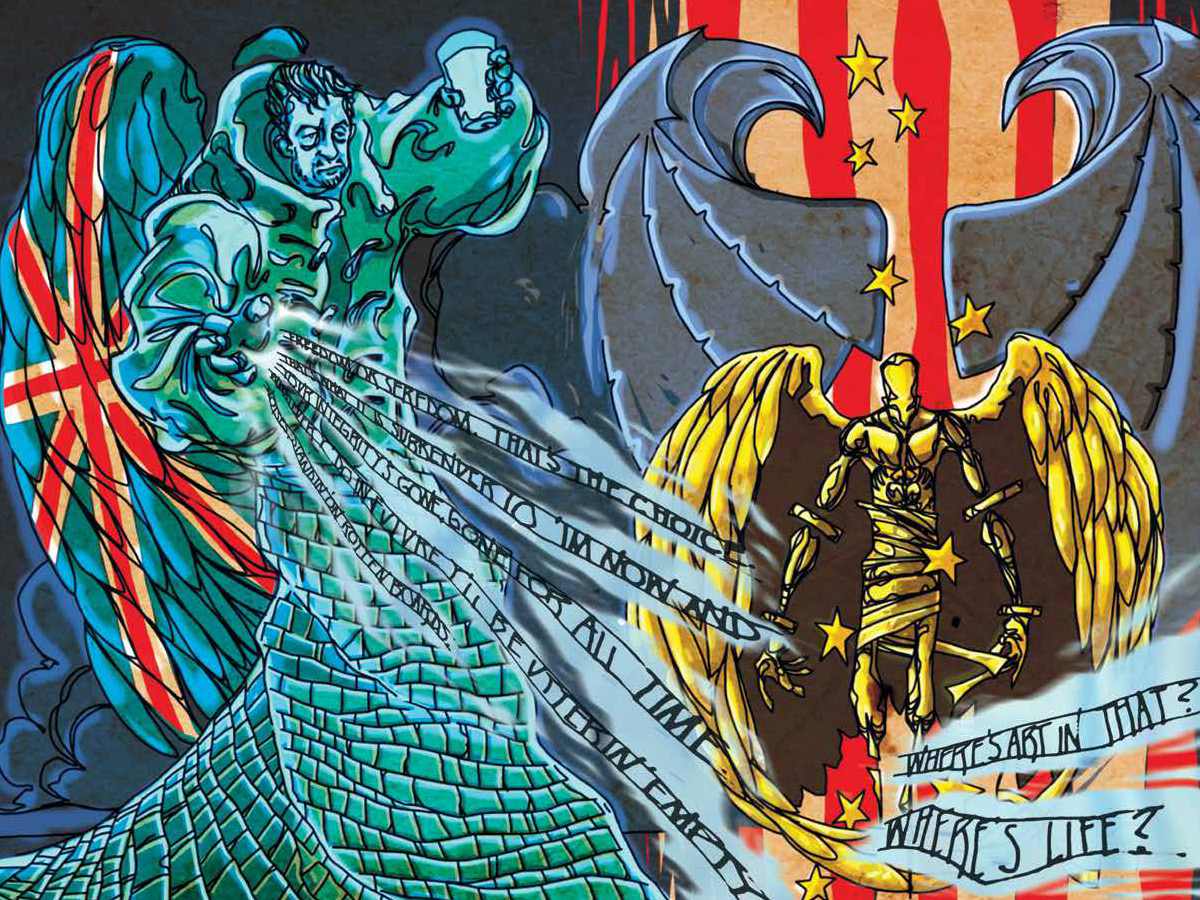
I walked down the unpaved bumpy road to the tavern, past the Egyptian cottage with the papyrus reeds of Isis, the Goddess, not the terrorists. I reached The Bull pub and Inn, Opened the heavy oak door and walked into a movie. The pub was nearly empty save for the bar that featured David on his bar stool holding court with his mates. Only his mates were images burnt on my retinas since childhood: John Hurt, Ben Kingsley, David Warner, Freddie Jones and his son, then unknown now better known than him, Toby Jones. I remember blinking in disbelief. I might as well have walked in on Lewis Carrol, Tolkien and CS Lewis downing pints all who had also frequented this pub some hundred years previously.
I remember David smiling, laughing his phlegmatic cough and motioning me over to introduce me to these faces from the screen. “This is Igor, he’s another writer; he’s a Yank but he’s alright”. I was just another writer in the company of actors, everyday workers taking a break from toiling in the star-maker factories behind the popular film. I was handed a bulbous goblet of glowing ruby wine and the rest is hard to remember. But I do recall making them laugh and David Warner towering over me and reminiscing about his one appearance in a two-part Star Trek opposite Patrick Stewart that had earned him enough to comfortably return to the stage for 7 continuous years. Apart from young Toby, these were board strutting actors; indifferent and virtually contemptuous of their movie work save for the vast sums Hollywood paid them for peddling their trade of packaged emotions.
The next year most of them would be dead, David Halliwell included. I would empty his cottage with a Scottish actor of his while his Yorkshire sister wept inconsolably on his stairwell. In England, people let you weep and leave you to the dignity of your grief out of respect for the exceptional display of emotion. If you openly weep in England its because the pain is so hard that you really can’t hold it in.
Back in the Sanctuum, I explained to my companions how David had taught me the true meaning and value of the literary arts, which for David included actors who tell stories with their faces. Storytelling’s place in the human universe, keeping the stars locked in their firmament and the cosmic spheres in perfectly balanced and meaningful rotation. David Halliwell wasn’t famous. He died a virtual pauper, alone, estranged from his sister, a Yorkshire man with an RSC accent from wanting to be an actor, who wrote every day of his life before heading down to the pub to argue with me.
But he was a great success, albeit not by any kind of American Calvinist standard. Rather he succeeded in staying true to his art. He never sold out to better-paid mediocrity. He stayed true to his art, to himself and he survived with the respect and admiration of his fellow artists. When he died, I wrote and read this eulogy at his memorial, after Harold Pinter came up from Hampstead to say a few words about his departed friend. As did Stephen Frears and Scott Hampton (author of Les Liaisons Dangereuses).
I read this poem to David to my friends Alex Bosworth and Chris Vannoylast night. And in my mind, I went hunting and visiting my own xmas ghosts to remind me of the true joys of this season.

Daedalus Afraid to Fly
David, you bastard, you’ve left me
Understanding here alone,
With only these words falling out of my hands
When it is yours I want to hear again.
Words of your mastery, not mine.
So what was all the swearing about then, David?
What were all those Northern fumes really burning from?
I told you the songs of Yorkshire would never play in LA
Or London for that matter):
Two cities equidistant from your Yorkshire mother.
Tell me, David, why didn’t you just sell out?
You could have bought yourself a much better pint of beer
With all that money for old knotted ropes and
Still, have coughed up the phlegm to laugh at us all.
Is death your idea of some kind of joke?
Did you finally track down the film rights to Malcolm, David
And cash them in?
Are you really, secretly living in Barbados,
Making beautiful women miserable?
To think of all this wasted sorrow and
Empty glasses of beer.
You did say that you always wanted to visit other places.
But Daedalus, you were afraid to fly.
If you had been born upside down in America
You would have been a southern writer living in some Northern town.
Spilling your southern drawl over a rum and coke in a New York City bar.
Sitting elbow to arm with Williams, O’Neill, Baldwin and them all.
Your America was always an America of the mind.
So why fear the flight?
Your America David was where Charlie Parker
was forever sharp shooting pool with Humphrey Bogart
in some room behind a neon-splattered bar
Where Chet Baker never jumped or fell but flew, man!
He just flew away.
Just like you.
So you’re off then, David?
Back up the bumpy road,
Turning the corner around the Little Egyptian cottage
Navigating the reeds of Isis, Long past the close of time.
A brown duffle coat ship, bobbing on an unpaved surface,
Weaving a few well-spoken thoughts into your
Captain’s cap.
Can you tell me, David:
Were you X-Centric, or
Merely Eggs Essential?
How about this time I tell you, David:
The spark was always there.
But not like Daedalus, like Prometheus.
The living punishment of Truth,
Chained to your bar stool,
That eternal pint of Carlsberg lager gnawing at your liver.
Like Prometheus David,
The spark is always here.
For the late, great David Halliwell; poet, playwright,
author of Malcolm’s Struggle Against the Eunuchs.
I can only miss you when you’re gone.
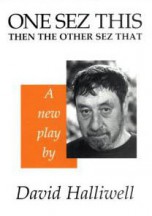
Essay on Everyday Zen

 I think this is the closest I can come to describing the Zen disposition. I say disposition because too much is made of practice and the philosophy of Zen when all are merely aids to assist in the unravelling of illusion and self-deception. Zen is not an acquisition of skills, rituals, garments or ideology; instead, Zen is relinquishment. It’s a reminder to keep paying attention. Not acquiring but letting go: unravelling, stripping away layers of calloused skin, leaving your baggage behind and not looking back over your shoulder. In the words of the bard:
I think this is the closest I can come to describing the Zen disposition. I say disposition because too much is made of practice and the philosophy of Zen when all are merely aids to assist in the unravelling of illusion and self-deception. Zen is not an acquisition of skills, rituals, garments or ideology; instead, Zen is relinquishment. It’s a reminder to keep paying attention. Not acquiring but letting go: unravelling, stripping away layers of calloused skin, leaving your baggage behind and not looking back over your shoulder. In the words of the bard:My toes too numb to step”.
Awareness is larger than the body.
Insomniac Awareness

Recent rewrite. When I first wrote and posted it, no one seemed to know what I meant by it. But now it’s becoming a favoured read aloud piece:
Insomniac Awareness
We who are hiding in our second bedrooms,
Licking the silver from the backs of our screens,
Are living in a different time zone
Of Insomniac Awareness.
Sometimes two, sometimes three, sometimes four or more
Lives are lived and lost each night.
In our rooms, by ourselves
Sitting precariously on the edge of our beds.
This is our legacy
The lasting perpetuity of our sensory species:
The glow that contests the light that once shone from our eyes,
Right up to the surface of our understanding.
What is not yet known.
Or what was known and long since forgotten.
Dances across the screen you stare into.
Tripping over your coded memories; in Real Time.
Who are you reading this? Do you know
Do you know
What perturbs your sleep-walk into the night?
Or are you merely waiting for the screen to pull you through?
Into your own quiet world,
Where things that count never change.
And no one is dreaming you but your mother,
Who has left you now for another child.
©Igor Goldkind 2017
Death is in My Garden Again.

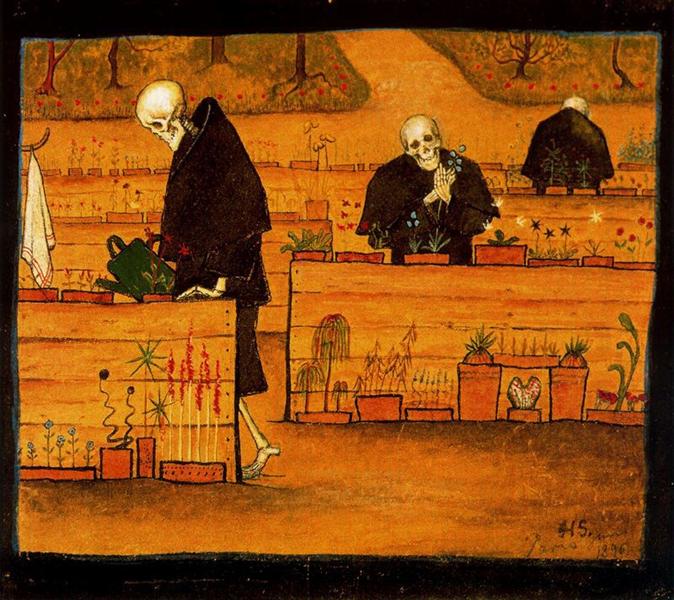
Death and his brothers are in my garden again.
Moving my plants around.
They tend to the growth quite delicately
Careful to not reap the harvest until the plants mature
And begin to lose their hair.
Death and his brother are in my garden again,
Whispering to each other as they pull away the weeds.
Poting and repotting each plant as it grows
Making sure the roots are clear of regrets and debris
So that in the end, it’s life can be cut short more easily.
Does death have a sweetheart? I wonder.
A woman whom he woes with words of love?
As much as death can love any living thing, at all.
He gathers my plants into a beautiful bouquet
Of lost souls and freshly cut lives.
To gift to she who holds him near; squeezing his dead heart in one hand,
My faltering flowers in the other.
IS SHE AVAILABLE? Get My Book and FIND OUT.

NOTHING has prepared you for This. Nothing ever will.
Because whatever is happening Now has never happened before.
This is a web-nurtured collaboration with 27 artists, sculptors and musicians from the world of Comics, Fantasy, Fine Art and Jazz, including Bill Sienkiewicz, David Lloyd, Liam Sharp, Glenn Fabry, Shaky Kane, Lars Henkel and the cutting edge sculptural typography of the highly acclaimed book designer Rian Hughes.
This illuminated book is a contemporary Dante’s Divine Comedy; a journey through the confessional landscape of a masculine identity. It uses poetry to construct a narrative that explores themes of death and loss, sex and love, and the modern American and Jewish identity design: by the UK’s eminent graphic designer, typographer, illustrator Rian Hughes.
The music is composed and produced by iconoclast, ex-Israeli, Middle-Eastern jazz virtuoso Gilad Atzmon, along with five other jazz artists.
Written by San Diego native Igor Goldkind, this illuminated book will revolutionize the way you view poetry by meshing comics, art, music and animation in a truly unique way. It uses poetry to construct a narrative that explores themes of death and loss, sex and love, and the modern American and Jewish identity. The book is available for download on the iTunes Store and Google Play, as well as in a 166 page, fully illustrated in colour hardbound edition available ORDER HERE.
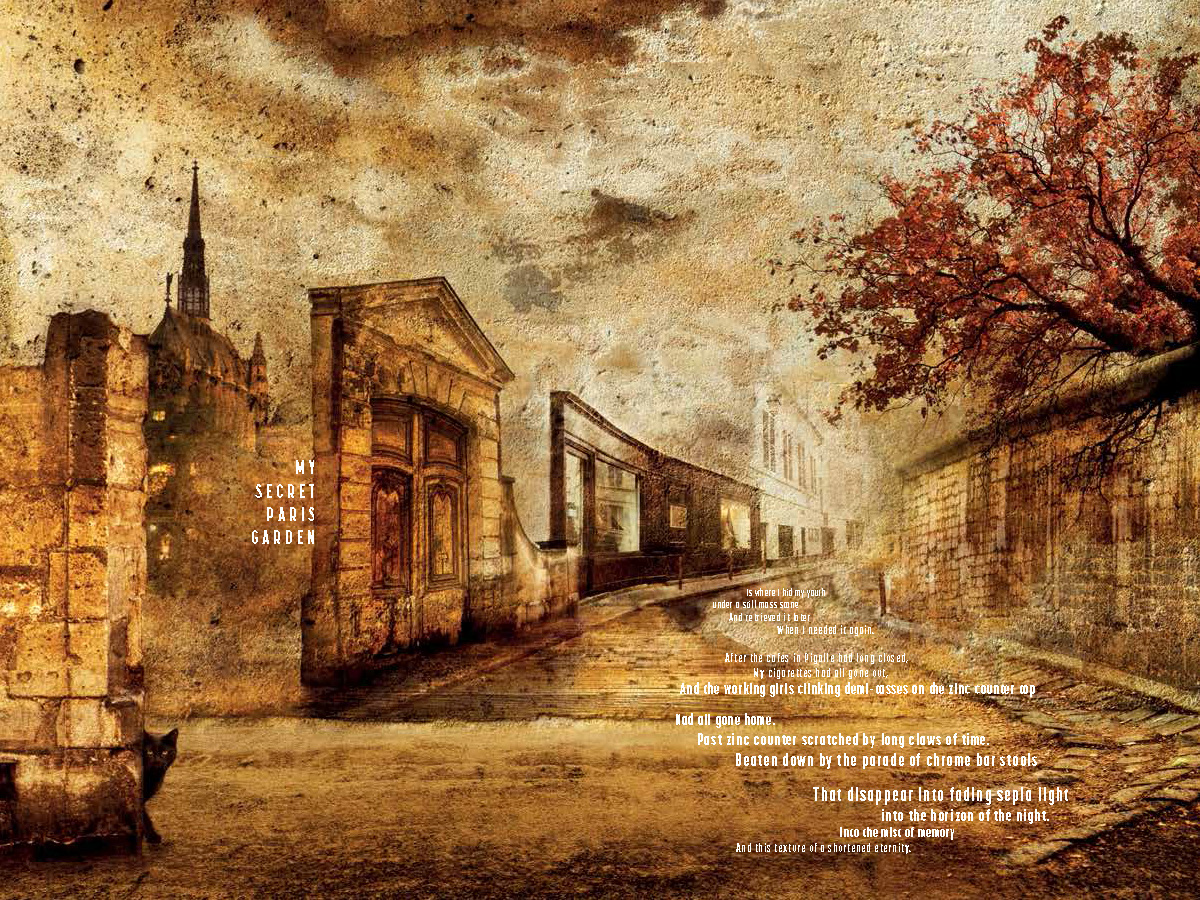
The eBook edition pushes the edge of what is possible with present EPUB3 technology. It is not an App, it is a true book that marries pop art, comics, avant-garde, jazz, spoken word poetry, video and animations, and type design in a manner that we have not seen before IS SHE AVAILABLE? has the feel of an artefact from the near future – a seminal work of a new genre-fusing poetry, graphic art, music, and animation.
Sample interior pages:
IS SHE AVAILABLE? RRP is $34.95, SHIPPING INCLUDED
Educational Discount for Students and Teachers: $29.95
Both deluxe hardcover edition PLUS animated and musically scored eBook App edition of Is She Available? bundle: $39.95
Go to http://Paypal.com/issheavailable/ and place your order directly through PayPal with all Pay Pal assurances and protection.
Shipping included in orders within the US and its territories.
If you are in Britain and/or Europe, please contact my European wholesaler Fanfare Productions who will take your order and dispatch to your address the same day: stephen@fanfareuk.demon.co.uk
Reviews ? Sure We Got Reviews. Why You Wanna See Them? Be my guest.
“Igor’s “Illuminated Book” is like a new genre. It is a wonderful ekphrastic expression; a fusion of the arts.” — Poet Mel Takahara
“His collection Is She Available? has the feel of an artefact from the near future – a seminal work of a new genre-fusing poetry, graphic art, music, and animation.” —(San Diego’s) City Beat
“Is SHE Available?” is an experiment, and reading it feels more like an act of discovery… nonetheless there’s a thrill to scrolling through its pages. It’s an ambitious step toward what digital media can (and will) be.”—The Chicago Tribune
You Tube samples: https://www.youtube.com/playlist?list=PLRnmT_aE0acoowdNBvFtK_VW2OkNN2wWp
SoundCloud samples : https://soundcloud.com/igor-goldkind/sets/is-she-available-spoken-word
The 166 full colour, fully illustrated hard cover deluxe edition is available in discerning and eclectic independent bookstores everywhere. Including Fahrenheit 451 in Carlsbad, Soulscape Bookstore in Encinitas, the Upstart Crow in San Diego, Verbatim Books and Mysterious Galaxy also in San Diego, City Lights and the Cooperfields chain in Marin County and Sonoma County, amongst a growing number of independent book stores.
Order direct from PayPal and shipping is included!
https://www.paypal.me/issheavailable
Sleepy Mind; Awake Mind

And Zen-some!
The only way to explain Zen is by describing the sleepy mind. The sleepy mind describes a tree in terms of attributes and data: the number of leaves, the leaf shape, the number of branches, thickness of the trunk, the colour of bark. Which birds make use of the tree etc.
All these observable and measurable attributes are assembled as data by the sleepy mind and voila! the sleepy mind thinks it knows what a tree is. The sleepy mind can give arguments with citations about the validity of its data. The sleepy mind works well with other sleepy minds.
And the sleepy mind isn’t totally wrong, the data it compiles in reference to ‘tree’ are all real and quantifiable features of the tree. But no matter how exact or comprehensive, the data is not the tree nor even the experience of the tree.
The awoken mind merely says “Look, a tree”, and points.
Because there is no data that conveys the experience of that tree in the moment of your apprehension. The awoken mind, sees the leaves, the branches, the colour of the bark, the thickness of the trunk, which birds fly in and out of the tree as much and as well as the sleepy mind does.
But the awoken mind also sees that the spaces between the leaves are part of the tree. The negative space surrounding the tree. The unseen roots spread beneath the ground are part of the tree. The sunlight reflecting off the green of the leaves are part of the tree.  The seat waiting to rest your back against the trunk is part of the tree. The awoken mind ‘see’s the tree; the form of the tree; the tree itself in all its ‘tree-ness’, the tree as a child sees a tree; not what the sleepy mind contrives to substitute as its surrogate.
The seat waiting to rest your back against the trunk is part of the tree. The awoken mind ‘see’s the tree; the form of the tree; the tree itself in all its ‘tree-ness’, the tree as a child sees a tree; not what the sleepy mind contrives to substitute as its surrogate.
I think this is the closest I can come to describing the Zen disposition. I say disposition because too much is made of practice and the philosophy of Zen when all are merely aids to assist in the unravelling of illusion and self-deception. Zen is not an acquisition of skills, rituals, garments or ideology; instead, Zen is relinquishment. It is a reminder to keep paying attention. Not acquiring but letting go: unravelling, stripping away layers of calloused skin, leaving your baggage behind and not looking back over your shoulder. In the words of the bard:
“My senses have been stripped, my hands can’t feel to grip
My toes too numb to step”.
 Buddhists will talk about the Buddha-nature as universal, the same as our original nature. Don’t listen to them. The face that first looked up at your mother’s face is still there, submerged and (sometimes suppressed), within you. All that Zen suggests is that we are encumbered by needless worry, anxiety, expectations, daydreams and nostalgias that have buried your true self under the rubble of your crumbling castle and keeps you from seeing the world and your place in it, with any clarity.
Buddhists will talk about the Buddha-nature as universal, the same as our original nature. Don’t listen to them. The face that first looked up at your mother’s face is still there, submerged and (sometimes suppressed), within you. All that Zen suggests is that we are encumbered by needless worry, anxiety, expectations, daydreams and nostalgias that have buried your true self under the rubble of your crumbling castle and keeps you from seeing the world and your place in it, with any clarity.
We are all distracted by anxieties and worries about money, about jobs, about partners and children. That distraction is manufactured by the powerful in the society we live in to keep us consuming, acquiescent and very sleepy! It doesn’t matter if you meditate or not; if you read poetry or not; if you drink tea or practice martial arts or not. It doesn’t matter how you get there or what you wear; just that you wake up and experience the miracle of persistent and unwavering creation. The universe is created, then destroyed then resurrected millions of times a second, faster than you can blink; so try and keep your eyes open!
I leave you once again with the immortal words of the Nobel Prize laureate:
“Then take me disappearing through the smoke rings of my mind
Down the foggy ruins of time, far past the frozen leaves
The haunted, frightened trees, out to the windy beach
Far from the twisted reach of crazy sorrow.
Yes, to dance beneath the diamond sky with one hand waving free
Silhouetted by the sea, circled by the circus sands
With all memory and fate driven deep beneath the waves
Let me forget about today until tomorrow.”
– With Compassion, Igor Goldkind, 2017
Please feel free to share and copy this.
I’m just trying to help anyone who’s read this far.
The Third Act of Creation

The Third Act of Creation
When I sit at my desk in the barely blinking dawn,
I sit at the helm of a Starship.
Each dimension of time or space is available to me
To go anywhere I want to.
With the flick of a switch and a weird background sound
The course can be faithfully plotted,
At just the right warp speed to be there, be heroic and be back before dinner.
As safe as the hum of my engines.
When I sit at my desk in the mid-morning blue light that pierces
My east facing windows.
I pray that I can write something today,
 I pray that I still have something to say.
I pray that I still have something to say.
My eyes are drawn to the street just beneath me,
That winds around the standing tree,
Just outside my window.
There is a spoonful of sunshine in my coffee.
When I sit at my desk in the midday sun
At the zenith of all of Creation,
I know that the bright light that now floods my room,
Will wash the shadows of doubt from these walls.
I still hear that first sound,
The Bang! that expands the spaces around.
I can feel how the act of creation was never just one moment long gone ago.
But a circus of new sensations, an ongoing show. 
Will too soon leave us behind sleeping eternity away.
When I sit at my desk in the mid-afternoon sun
And the light of creation slowly dwindles,
I can reflect on all the things that I’ve done
While counting the tasks that remain to lie in the sun.
When I sit at my desk at dusk’s twilight time
When light and darkness are twined,
Each wrestles the other to the ground.
I know that darkness will eventually swallow,
The fading strength of the light.
The time for my bed is just insight
And the twin brothers have given up their fight.
When I sit at my desk in the heart of the darkness 
I know that death is hiding in my closet.
I know that the covers I wrap so tightly around me
Offer no protection from what time has brought (me):
The drowning of the light by the darkness.
I bury my head in the night and dream of the return of tomorrow.
© Igor Goldkind, September 25th, 2017
Crime Against Our Own Humanity

People have been asking me why I chose the risk of first publishing a book of poetry before publishing my collection of short stories THE VILLAGE OF LIGHT and my first novel, THE PLAGUE. Why launch a writing career on the back of such a neglected and unpopular form of literature?
My first answer has been that as a keen admirer of the actor William Shatner, I wanted to emulate his career; first as a starship captain (in my mind), and second, as a genius of the Art of Spoken Word.
But the non comedic reason is worth explaining here: throughout every major epoch of human achievement and civilization,
reason is worth explaining here: throughout every major epoch of human achievement and civilization,
Poetry has maintained a major position in the spectrum of human arts; true across society, cultures, oceans and centuries.
Until now.
This dawning century of technological, scientific and artistic achievement; this era we currently reside in, is the exception to the human rule.
We have exchanged our ability to appreciate Poetry for other more comfortable and lascivious sensations. We have unlearned the sensibility to immerse ourselves in the healing waters of an art that we, as a species have grown like a medicinal herb in the human garden, to salve the pains in our souls and our minds .
By turning our backs on those warm healing waters we have damaged ourselves. We are all in dire need of rehabilitation.
And that is exactly what Poetry mystically, delivers.
Poetry sets you free, for free!
If you know how to notice and pay attention to the subtler colors in the spectrum of your mind’s cognition.
Which is a Poetic thing to say in that it is both metaphoric and literal at the same time.
Poems allow the mind to synthesize (reconcile), apparent opposites and to understand the deeper resonances of our human experience, in the simplest of terms, arranging words like pebbles on a dry river bank and in the broadest, to enter the harmonic rhapsody of our humanity and its sense of rhythm in this universe.
That rhythm is the breath, which is true to us all who are living. Poetry is the sound of our breathing in this world. If you want to know who a people strange to you are, read their Poetry; the words they have chosen to express themes, that persist for us all: Birth, Death, Love and the swirl of illusions inbetween.
Poetry is a drastic intervention meant to make you better. Not just feel better, but actually see, understand and *be* better than you are, which may feel strange at first.
Only bad poetry is comfortable. Trying to be the best that you are, to overcome ones self, may take more than one lifetime to achieve. But so many Poems offer roadmaps of the soul. Guidebooks from which you can detect what is universal about humanity, about the human subjective experience, and your place in this present.
So that is why I chose to launch my writing career, with my current publisher (Chameleon), with a book of Poetry:
You can order a signed and dedicated copy of my book IS SHE AVAILABLE? directly from PayPal Here
I chose to publish Poetry first specifically because it is the form of literature that has proven to be least popular at the moment, as this marketing study details.
I’ve always stood up for the underdog, be it in life or publishing. I stood up for Comics when they were largely looked down upon as adolescent drivel. I just never thought to myself in all my years on this earth, that I would need to stand up for Poetry, because it had now succumbed to more dominant dogs.
This is a great shame to me, as a reader of great Poets from virtually every culture and time period. I mean with Poetry it really is where all of humanity meets, outside of time and space. The very center of our collective space, where language is. Each one of us is both here and there: at the edge of meaning. The words of the poem are are written by and read by the singular mind that spans all of us to that edge of comprehension. Poetry is the very understanding that we seek, in our selves and in others.
Poetry is the very understanding that we seek, in our selves and in others.
It is passive crime against our own humanity to let this art subside, due to laziness, neglect and superficiality.
So do your soul a favour and read a poem. Not just mine, any poem will do. Any Poem will set you free, for free; or at least at the modest cost of your attention.
In My (always) Humble Opinion, ofcourse.



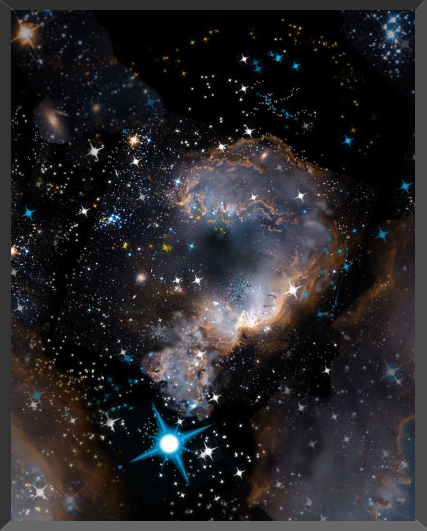
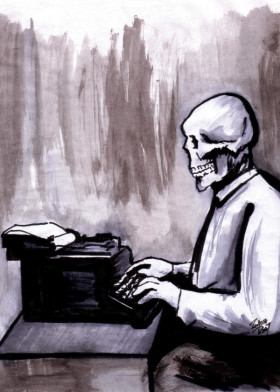

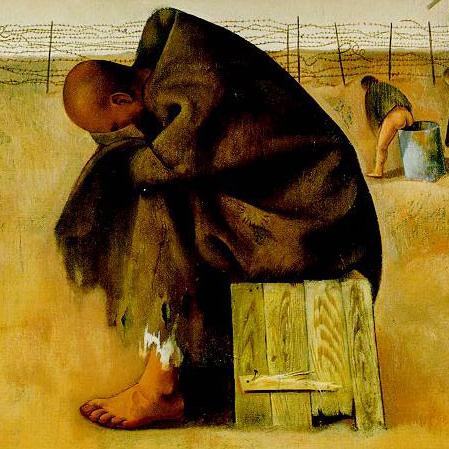





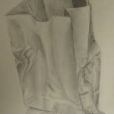












COMING SOON! The Cure for Pandemania
Take a Deep Breath – Living With Uncertainty
A book of poetry and art, fables and philosophies aimed at the pandemic of crisis anxiety so many are facing.
In uncertain times people turn to uncertain means. This is a book of poetry and art, of fables and philosophies aimed at the pandemic of crisis anxiety so many of us are going through right now in our daily lives and in our inner spaces. We are all of us and each us in this together.
The sciences but also the arts do provide remedies. The ancient Egyptians wrote curative words on fragments of papyrus to feed their burnt ashes to the afflicted. Lacking morphine, Walt Whitman read verses to fallen soldiers on the battlefields of the first Civil War.
At their best, the right words are more than therapeutic, they can be curative. Take a Deep Breath emulates this ritual here in administering remedies for living in these times of crisis, in living with uncertainty.
Share & Disseminate This With Your Friends
January 5, 2021 | Categories: art, beat, book launch, books, comments about poetry, death, Emptyness, epublishing, Healing, Igor Goldkind, jazz, literature, Meaning of Existence, Meditations, mental health, Mindfulness, new poetry, Paper Bag, poetry, Poetry as therapy, Poetry Therapy, Self-Therapy, sex, spoken word, story-telling, Suicide, The Inner Temple, Therapy, Uncategorized, Zen | 1 Comment